HOLE NOTES
The Official Publication of the MGCSA V. 57, #9 October 2022


The Official Publication of the MGCSA V. 57, #9 October 2022

Hole Notes (ISSN 108-27994) is digitally published monthly except bimonthly in November/December, and January/Feburary by the Minnesota Golf Course Superinendents’ Association, PO Box 2028, Maple Grove, MN 55311. Chris Aumock Publisher. Please send any address changes, articles for submission, advertising and concerns to chris@mgcsa.org.
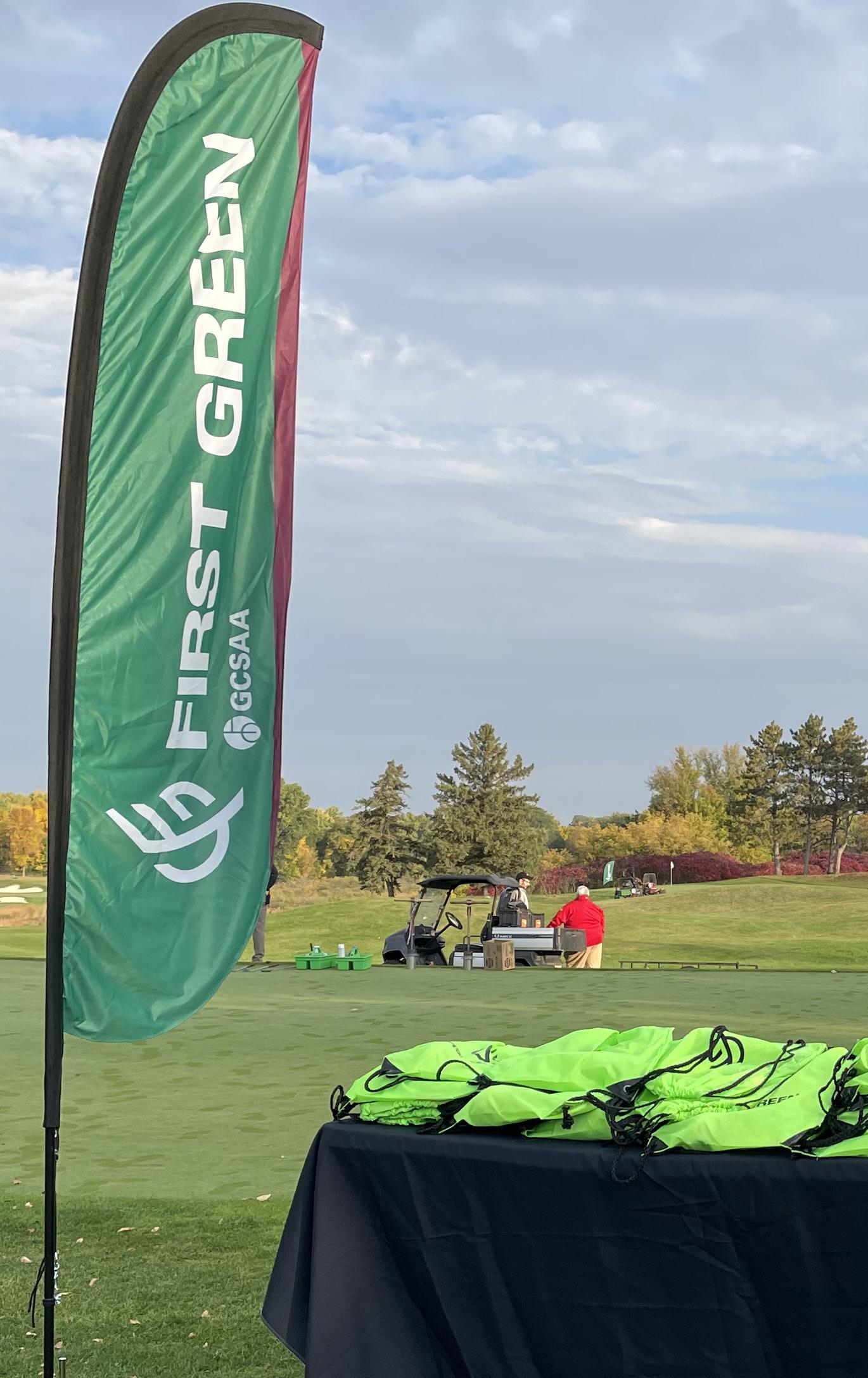
President Mike Sonnek
Vice President Matt Cavanaugh
Secretary/Treasurer Mark Michalski
Ex-Officio Scott Thayer
Director Joe Berggren
Eric Counselman
Director Nikk Dickerson
Geoff Jordan Director Ryan VerNess
Executive Director Chris Aumock
Berggren
Cavanaugh mattc@umn.edu
By: Dr. Paul Koch, UW-Madison Page 10-16

By: Glynis Bohnenstingl Page 22-25
By: Donnacha O’Connor Page 32-36
By: Joe Berggren Page 42-45
By: Dr. Eric Watkins, UMN Page 46-48
Presidential Perspective P. 2-6
From the High Grass P. 52-54
Northern Green Jan. 10-12

These are two quotes that have been circling through my brain for the past month or so as we at Royal Golf Club have been on a historic run of bad luck. Please bear with me as I vent a bit. I also have a number of thank yous to send out to those who helped us through our run of bad luck. My buddy Dave Kazmierczak at Prestwick has declared us cursed, not merely a run of bad luck.
September is a big month for us with a number of events including the Annika Intercollegiate, which is a 12 team women’s tournament which took place this year on the 11th -14th. I set up my agronomic calendar around this event. Our one in-season maintenance day
is the last Monday of August after completion of the club championships. On that day we topdress greens, pull 3/8” cores and fertilize. This sets us up for great greens conditions for the Annika as well as the rest of the fall. This year our maintenance day went off without a hitch. In fact, Jeff Ische from Toro brought out the new Pro core 648 aerator to demo which moved the day along even better. Thank you Jeff.
The greens turned out great. The golf course was doing great thanks to timely August rains. Little did we know what was waiting around the corner for us. The next day on August 30th I was driving down the cart path on hole #2. I looked over to see Kurt on the fairway
“If anything can go wrong, it will go wrong.” -Murphy’s law
“You cannot be serious!” -John McEnroe
mower making his turn by the pond. Only his turn changed into a surreal slide down the slope into the pond. “You cannot be serious!” Kurt had slipped his rear tire into a washed-out soft spot on the pond’s edge and down he and the mower went. Fortunately, Kurt was not hurt and swam off the mower. The fate of the mower remains to be seen. So now we are 12 days out from the Annika and down a fairway mower. Bob Frank and Shane Andrews at MTI were able to track down a fairway demo unit that we could use through
the event. They really saved our bacon. Thank you Bob and Shane. Next up we had a greens roller that decided it was a good time to check out on us. “If anything can go wrong, it will go wrong.” Once again, I made a semi desperate phone call. A demo greens roller was tracked down to help get us through the event. Thank you Ben Johnson at Midwest Machinery.
OK, that’s a couple of big hits at an inopportune time. That should be enough bad luck for one golf course. Not the case.

On the morning of September 6, Mel, one of our operators, let me know he just blew a hydraulic hose along 11 green. Five days before the start of our event. “You cannot be serious!” Will this curse never end? I weighed my options and decided to let the spill be until after the tournament. The area will just be a little discolored for the event.


This brings us to the next stop on our curse train. The night before the event on September 10th I set out on our sand pro with a brush attachment to stand up the grass
on the greens for a good cut the following morning. I was finishing a pass on the second green when I felt some liquid splash on my leg. I assumed it was my water bottle tipping over. Not the case. The fuel line had come loose from the fuel filter, leaving a nice gasoline streak on the green. “If anything can go wrong, it will go wrong.” This area was going to ugly up quickly, so my assistant Nick took on the task of plugging it out before Monday’s competition. Thank you Nick.
of unforeseen challenges, The Annika went smoothly. Annika, players, and coaches were all very complimentary of the golf course. I was just relieved we made it through. Time to catch our breath a little bit? Not so fast. It was September 20th and I was turning in for the night when I received text messages from our GM Kent and Dave at Prestwick. I open the text to see an all too familiar picture of golf ball size hail. “You cannot be serious!” How many more things can possibly go wrong? Who has two rounds of golf ball
size hail in one season? We had a spring hailstorm on May 19 as well. No rest for the weary! Fortunately, the second round of hail did not damage the greens as severely as in the spring. Still a round of heavy topdressing along with aerating with needle tines and rolling was required to smooth out the greens.

This is where I planned to end this letter but along with rain, (and hail), I guess comes fire. This past Wednesday, the day after hosting the MGCSA Scramble, our operator Ron

was out mowing down native areas with our Ventrac. At this point I ask myself “why wouldn’t the Ventrac decide to start on fire?” Luckily, Ron was safe. My assistants Shane and Nick were nearby and responded quickly with fire extinguishers to keep the situation from getting out of hand. Thank you Shane and Nick.
This must end at some point,
right? Oh, did I mention I narrowly missed hitting a deer going to grab lunch today? Maybe the near miss is a sign that things might be turning. I sure hope so. Once again, I hope your seasons are wrapping up in a much calmer manner than mine. I’m taking this morning’s coating of snow as a sign that things may finally be calming down.















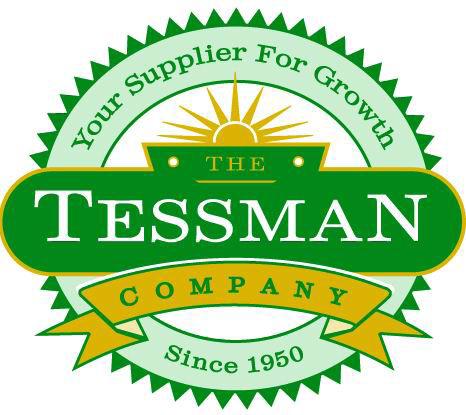










Thank you to all of our players for making this years event the largest one yet! We had 32 teams participate. Next year, make sure you sign up early and save yourself a spot in the 2023 Don White Match Play Event!!



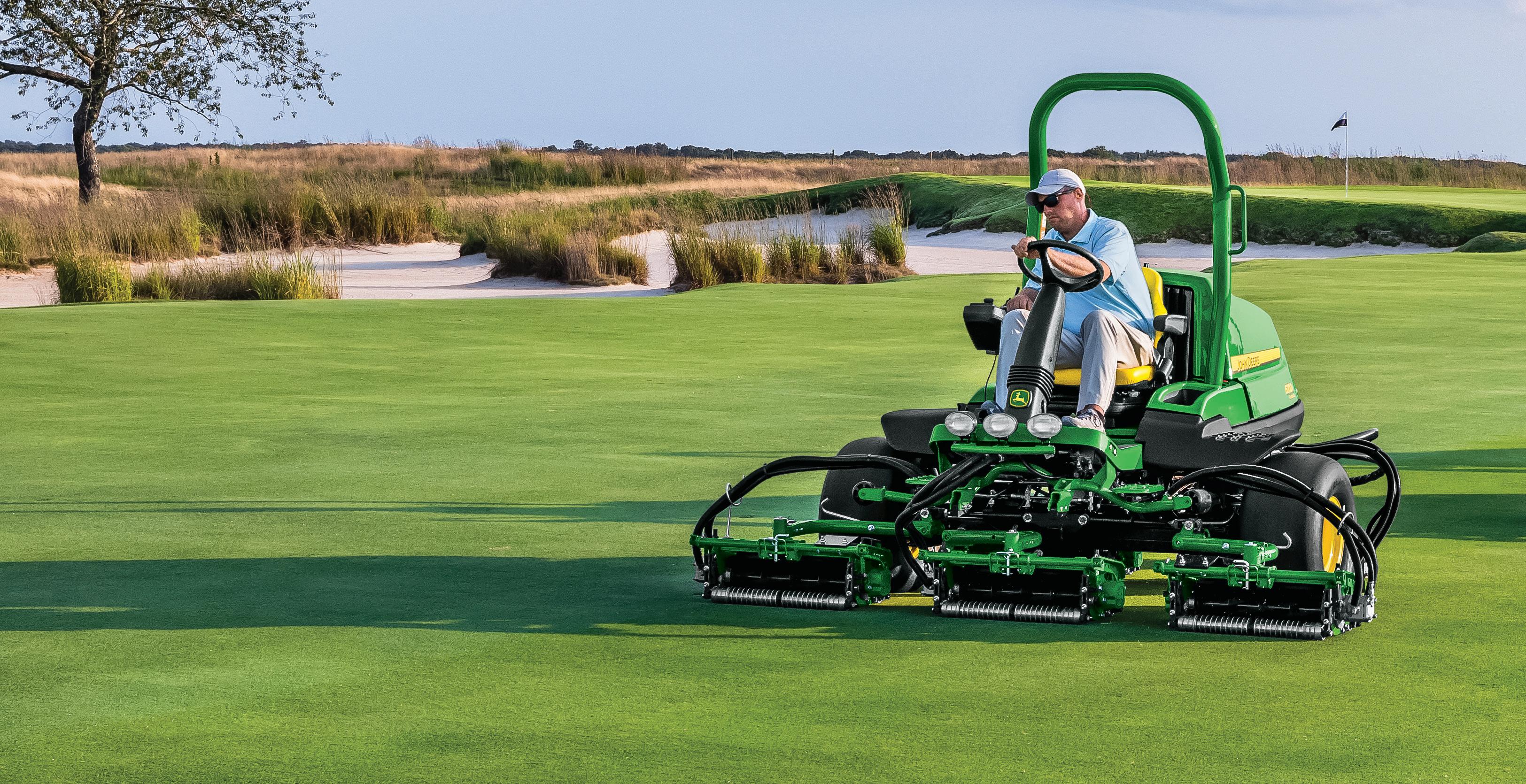

Author’s Note: Portions of this article were previously published in the September 2022 edition of Golfdom under the title ‘For snow mold, the future is pink’ and the July/August/ September issue of The Grass Roots, the official publication of the Wisconsin Golf Course Superintendents Association.
Snow mold is never far from our minds here at the UW Turf Pathology program, and this is especially true during the dog days of summer. While we’re all sweating and grinding through the end of another summer, Kurt and myself are preparing for the upcoming winter’s snow mold research. Before we talk about what to watch out for, let me take a quick minute to
talk about our 14 years of snow mold research that is freely available for you to view on our website (https://tdl.wisc. edu/results/). This research includes product evaluations to find the best products for all types of snow mold under all types of conditions, but also our research on the development of the snow mold timing model and other related projects. I encourage you to visit the site and look over the research results for yourself to get a better understanding of the most effective products and strategies for controlling snow mold. If you have any questions, please email me at plkoch@wisc.edu.
Now let’s talk about the winter, and winters ahead. I’m often
asked what impacts I think warming winters associated with climate change will have on snow mold management. The easy answer might be to say that warmer winters will result in less snow, which means less snow mold. But the more accurate answer is complicated. Shorter durations of snow cover typically mean less disease, but more winter rainfall events lead to more rapid dissipation of snow mold fungicides. In addition, warmer fall temperatures mean less hardening of the turf prior
Wausau CC
to winter, which leaves the turf more susceptible to snow mold development. In short, the only certainty that climate change provides for snow mold control is more uncertainty.
What does the research say? We have been fortunate enough to conduct snow mold research at numerous sites across Wisconsin, Michigan, Minnesota, and Idaho for a number of years. Since the fall of 2013 we have tested at the same locations at Marquette
Marquette GC
1. Snow mold type and severity at Marquette GC (Marquette, MI) and Wausau CC (Wausau, WI) from 2014 through 2022. The full reports from each of these years can be found at https://tdl.wisc.edu/result
Golf Club in Marquette, MI and at Wausau Country Club in Wausau, WI every year, which provides us some insight into how snow mold is evolving over a relatively short time period.
Wausau Country Club is located right in the heart of Wisconsin amidst towering pines along the Wisconsin River. Beginning in the spring of 2014 and going through the spring of 2017, snow mold in the non-treated controls averaged 65% (Table 1). However, beginning in 2018 and going through 2022, percent snow mold in the non-treated controls averaged 18%, and even that low number is inflated by a large amount of snow mold in 2020. Looking at just this 9-year period, the data from Wausau suggests that certain locations will in fact experience less snow mold, though they are still prone to significant outbreaks from time to time.
Marquette Golf Club is located in Marquette, MI along the shores of Lake Superior in Michigan’s Upper Peninsula. It’s northern location and proximity to the lake mean that it receives loads
of snow every winter, and as a result, typically deals with loads of snow mold (Figure 1). In looking at our disease data over the past 9 years from Marquette it’s clear that the overall amount of snow mold isn’t decreasing. From 2014 through 2017 the non-treated controls averaged 86% snow mold, while from 2018 through 2022 the nontreated controls averaged 87% (Table 1). However, the type of snow mold present does appear to shifting. From 2014 through 2018 the primary snow mold present was speckled snow mold (Typhula ishikariensis) in 3 of 5 winters. From 2019 through 2022, pink snow mold (Microdochium nivale) was the primary snow mold present in 3 of the 4 winters. This is one location over a relatively brief 9 years, so too small of a sample to make any definitive conclusions, but I’ve had conversations with superintendents from the Mountain West that have also noticed increasing levels of pink snow mold in areas that used to be dominated by gray and speckled snow mold.

From a biological standpoint, the fungus that causes pink snow mold is much faster growing and grows at a wider range of temperatures than the fungi that cause gray and speckled snow mold. This means that pink snow mold is more likely to take advantage of rapid swings in temperature and moisture, whereas the slow-growing Typhula fungi need months of nearly constant conditions to cause disease. This also means
that in winters where snow mold fungicide applications degrade due to winter rainfall or snowmelt events, pink snow mold is the disease most likely to take advantage of the lack of plant protection.
From a product selection standpoint, certain chemistries are more effective against pink snow mold than gray and speckled snow mold. While products from the demethylation inhibitor (DMI) class are key for control of
gray and speckled snow mold, chemistries such as iprodione, fludioxonil, prothioconazole, and thiophanate-methyl are important for effective control of pink snow mold. If you’re starting to see pink snow mold breakthrough, consider looking at the product(s) you’re using and make sure that one or more of the above products are included in your application.
From an application timing standpoint, don’t apply product based purely on the calendar. Dr. Gayle Worf was the University of Wisconsin turfgrass pathologist in the 70’s and early 80’s, and he always used to tell Wisconsin superintendents to have their snow mold product down prior to getting in the deer stand (ie the weekend before Thanksgiving). While that was effective advice then, today’s warmer falls and later starts to winter might not make that effective advice now. My program has been working since 2016 to create a model that would predict the optimal timing of snow mold fungicides based on the local environmental conditions that fall. While we need to conduct some additional
research before publicly releasing this model, the data we have conducted so far clearly indicates that timing of snow mold products is critically important for success. Our research suggests that there is a ‘window of opportunity’ for snow mold control that is approximately 3-4 weeks long leading up to snow cover, and the decline in control at the front end of that window is very sharp. In our 2019-2020 research, a difference of just 12 days in the application made the difference between a very effective application and failed application (Figure 2). We hope to have more information to share on this model in the next couple of years.
Should you change your snow mold program? In my experience, superintendents are more resistant to changing their snow mold control program than any other disease control program they have. I understand the hesitancy to try new programs, with snow mold you usually only have one shot to get it right. But as products and regulations and the environment changes,
we might also need to update our programs to see whether there is a better fit out there.
The best way to investigate this on your own site is to install one or more non-treated check plots around the property. The benefits of check plots are numerous. If they’re littered with disease, they illustrate to the golfers/membership/ownership the need for implementing these costly disease management programs (Figure 3). If they aren’t
littered with disease, and this holds true for several years, then it might indicate that you’re able to alter your program without any decrease in disease control.
To conduct all this valuable research takes a talented and committed group of people. First and foremost is Kurt Hockemeyer, who manages Wisconsin’s Turfgrass Diagnostic Lab and directs our field evaluation trials. This year we
Figure 2. The cutoff between no snow mould suppression and excellent suppression can be very sharp, as evidenced by this picture from Timber Ridge GC in Minocqua, WI in spring of 2020

again partnered with Professor Eric Watkins and Andy Hollman at the University of Minnesota on snow mold research at two sites in Minnesota. Lastly, the incredible superintendents who host our research and let us kill grass at their courses: Aaron Hansen at Wausau Country Club in Wausau, WI; Jay Pritzl at Timber Ridge GC in Minocqua, WI; Craig Moore at Marquette
CC in Marquette, MI; Matt McKinnon at Cragun’s Resort in Brainerd, MN; Jeff Simondet at Giant’s Ridge GC in Biwabik, MN, Rick Mooney and Nick Korthals at Whitetail Club in McCall, ID, and Eric McCormick at McCall GC in McCall, ID. Thank you to everyone for making our snow mold research successful year after year.











Figure 3. Check plots, whether on the course or on the research plot (like this one), are an excellent tool to better understand your past, current, and future snow mold pressure.
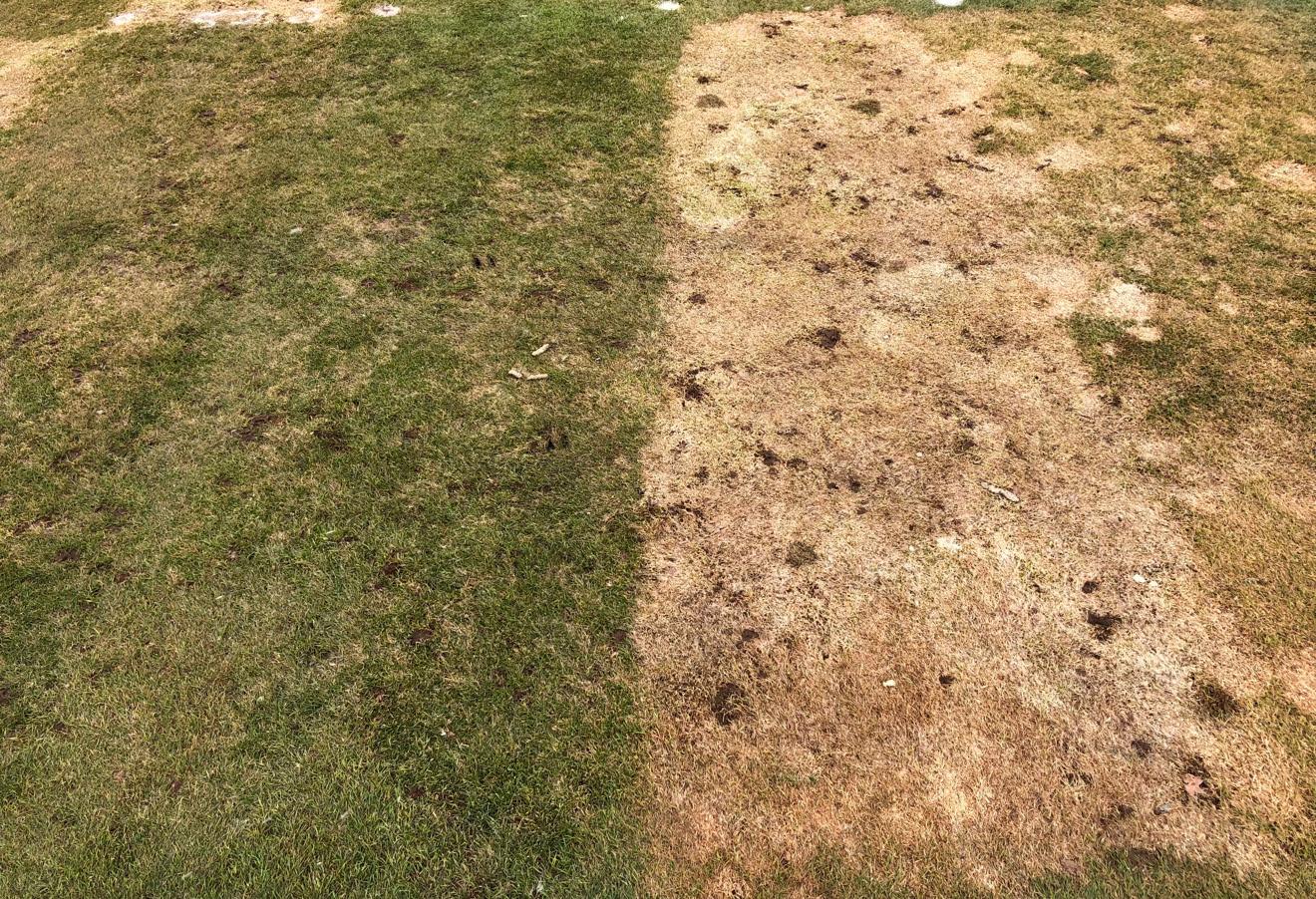






















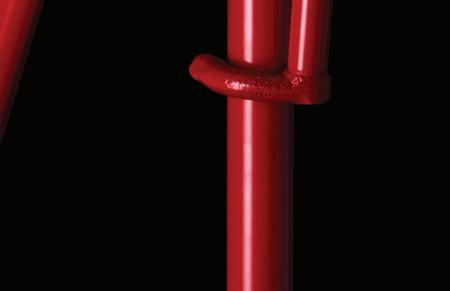














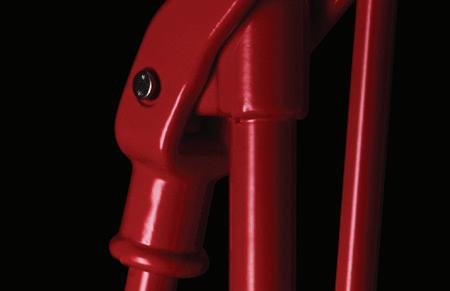









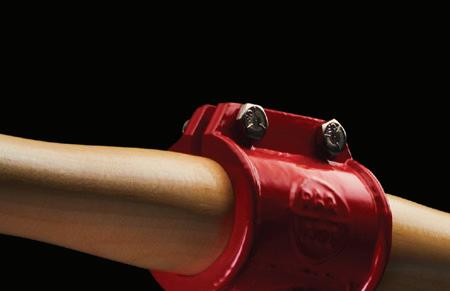










On Wednesday, October 5th, Rush Creek Golf Club hosted a First Green Field trip for students from the Anoka-Hennepin School District. We had nearly 50 students on hand learning about golf courses and turf maintenance! Thank you to our Rush Creek hosts; Matt Cavanaugh, Betsy O’Donnell, and Ben Wiesniewski, and our volunteers and supporters; Matt Olsonoski, Mike Brual, Brad Smith, Meghan Bicek, Mark Michalski, Nikk Dickerson, and Randy Robinson!


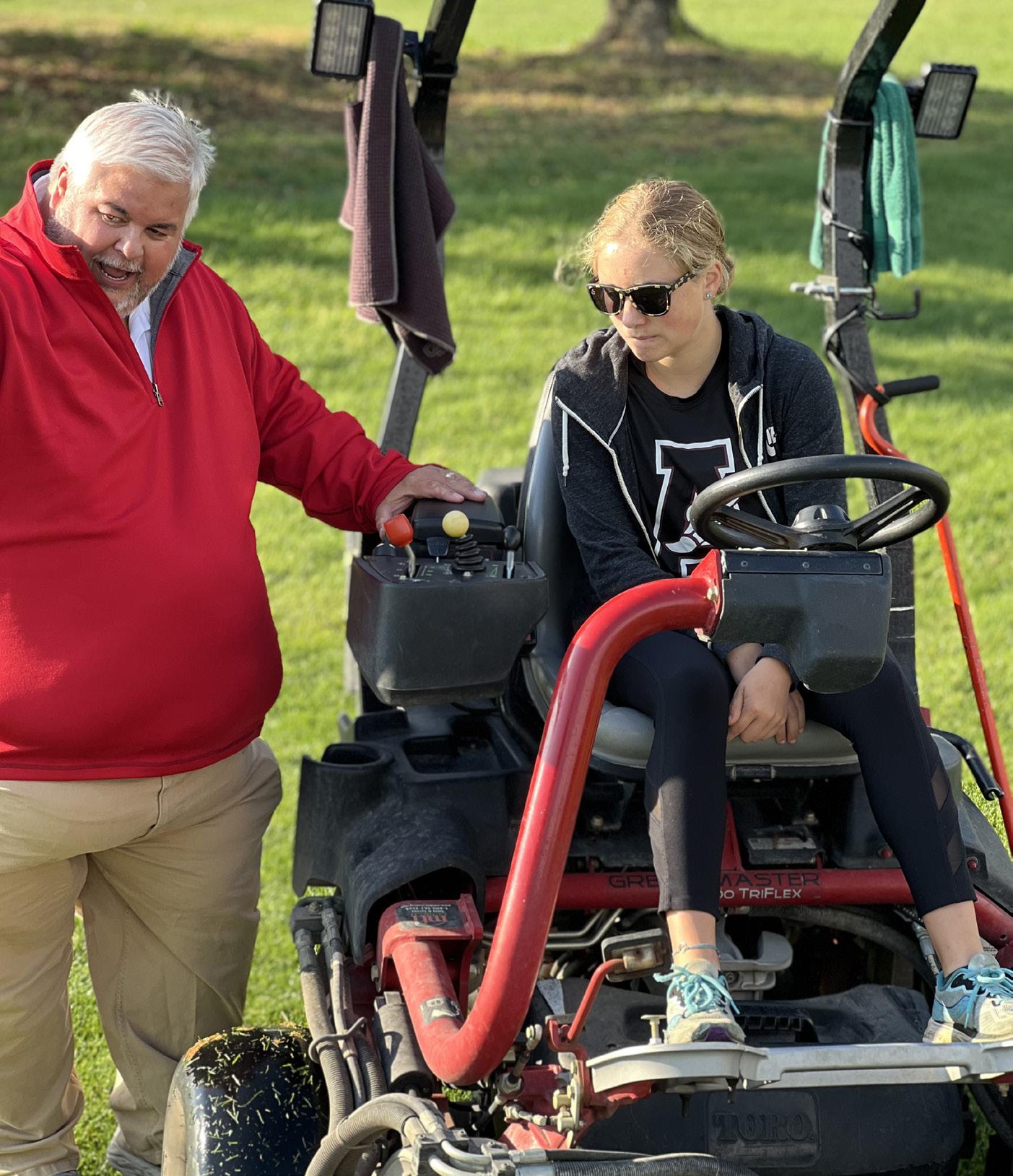

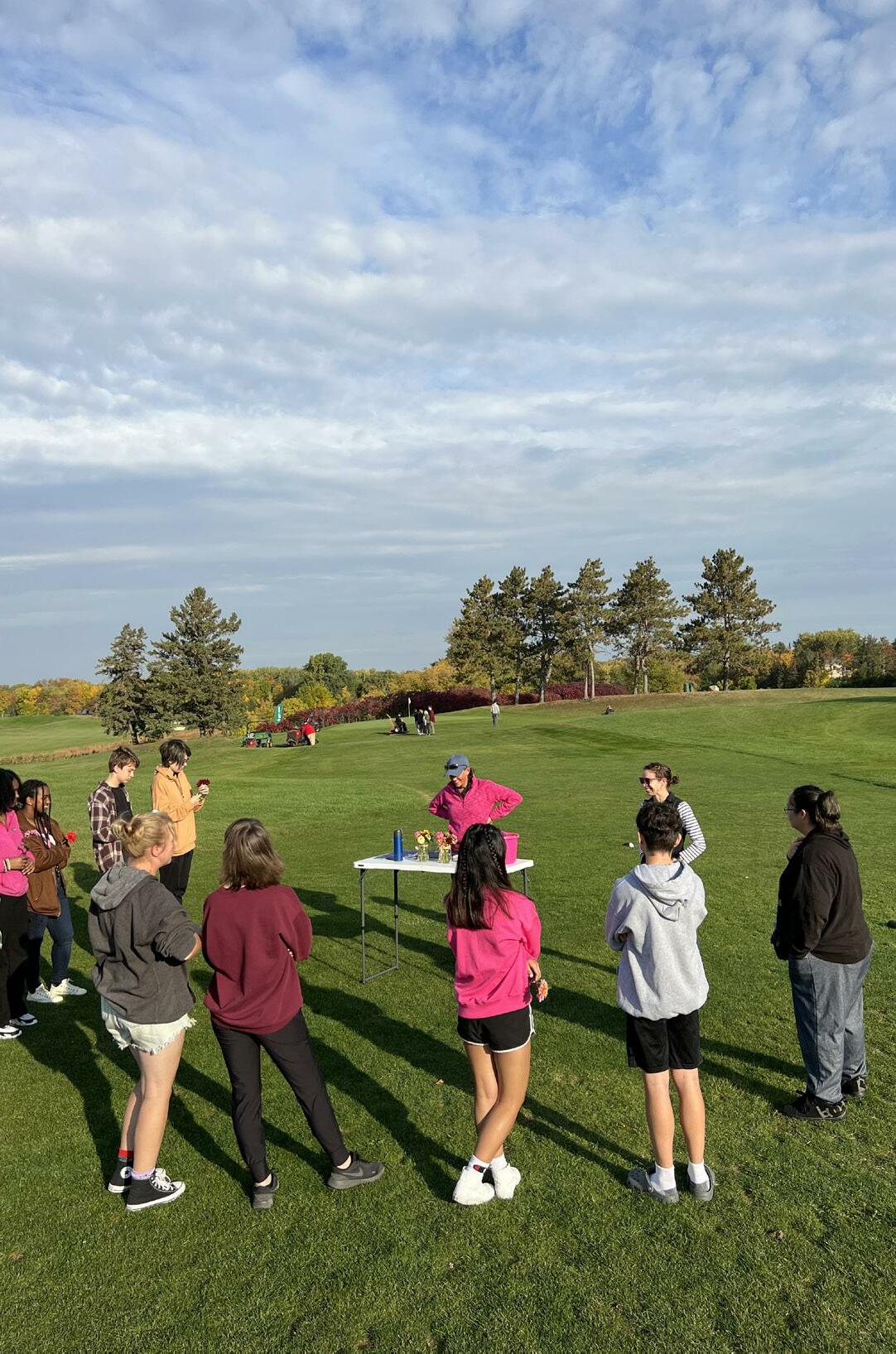
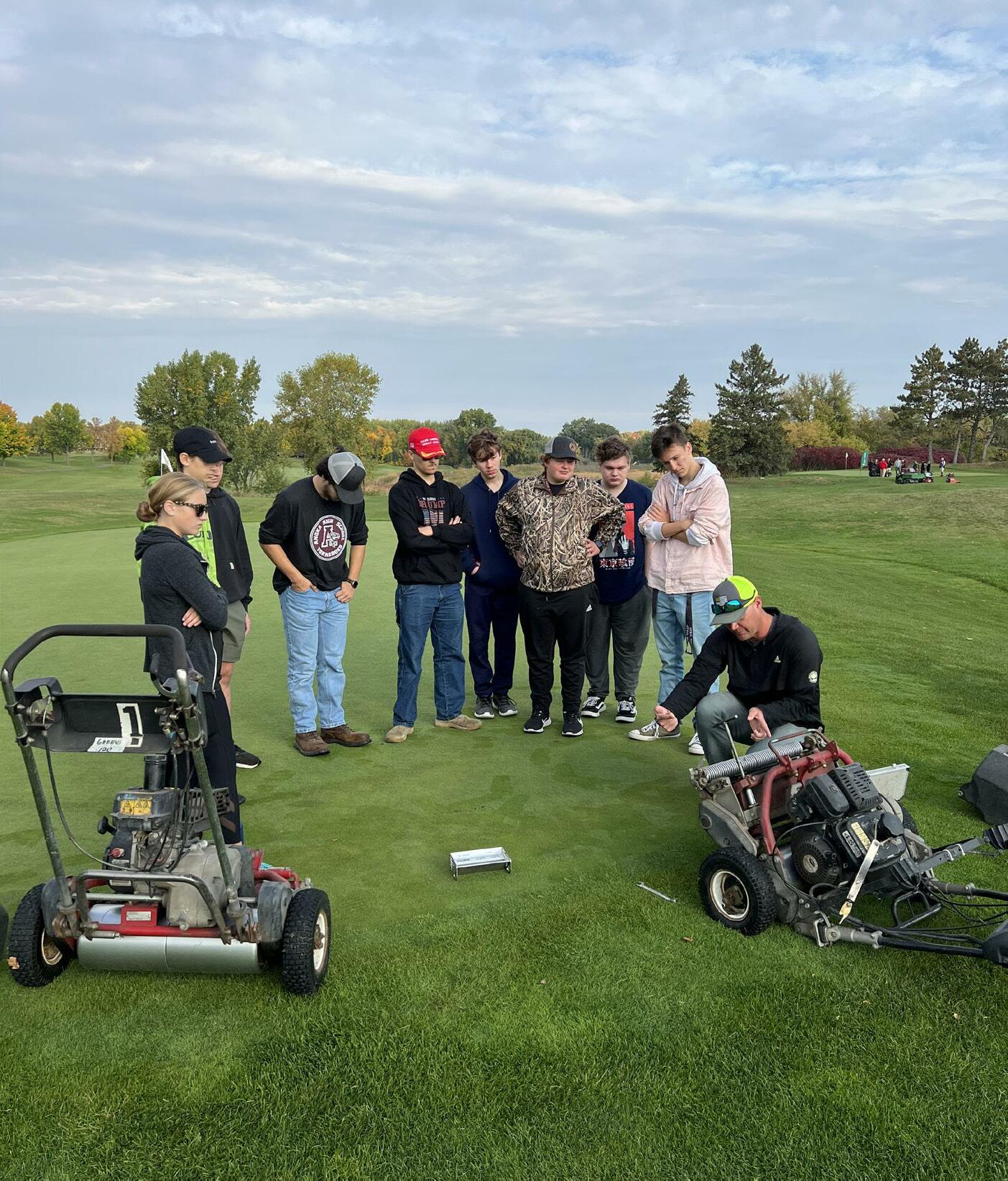



Ed Note: This letter was sent to the Wee One Foundation after the Bohnenstingl’s received financial support this year from the Wee One Foundation. Glynis has offered to share her own words to update the MGCSA membership and show how grateful they are for the blessings they have received.
My husband, Chad Bohnenstingl, is the Superintendent at the Preserve Golf Course in Pequot Lakes, MN. He had a stroke on August 14, 2022, and we have been devastated by this. Chad not only takes care of his wife and kids, but also helps his 95 year old mother on a daily basis.
Chad helps my mother (age 84) with lawn mowing and fixing things around her home. He even helps the neighbor across the road from his mother, as her husband is in hospice.
Chad had two weekends off this summer and his stroke
occurred on a Sunday when he was at home. I thank God for intervening and protecting Chad because if the stroke happened at work, I don’t know how long he could have been somewhere on the golf course by himself, in need of help.
Our son, Noah, is 20 years old and is studying neuroscience at the University of MN. Noah found his dad on the floor at 7:30 am Sunday August 14 and told his dad not to try to get up because he was having a stroke. Chad was completely

paralyzed on the entire left side of his body, including blindness in his left field of vision in both eyes. I’m grateful Noah had the knowledge to know what was happening and what to do. I believe God had a hand in that as well. Noah was going to move to the U of M that day.
Chad was taken by ambulance to the Brainerd hospital ER and it was recommended that he be flown by helicopter to United Hospital in the cities; however, it was too foggy that morning to fly. The ER did not administer the TPA (clot busting medication)
because the neurologist consult from Allina stated it was too late for the medication as it needed to be administered within 4 hours of the onset of the stroke and the consult believed the stroke started when Chad was asleep. The doctor recommended Chad be transported to United Hospital via ambulance as no helicopters were able to fly. The ambulance was enroute to the cities and when it got passed St. Cloud, the EMT determined Chad was getting worse and he be taken to St Cloud Hospital. God definitely had a hand in
this as the St Cloud hospital ER doctor determined Chad’s stroke started between 7-7:30 and administered the TPA medication which showed immediate effects. The doctor then took Chad into surgery to remove the clot.
I am so grateful Chad got to that doctor at that hospital as he is one of the best stroke treatment doctors in MN. The following day, Chad had to have surgery again because of swelling of the brain. The surgeon removed a portion of Chad’s skull, which he still does not have as of today. The St. Cloud doctors and staff were fantastic. Chad was released from the inpatient rehabilitation area of the hospital on August 30, and I brought him home. He is able to walk with support of a cane or walker. He has to wear a helmet when he is not in bed because he does not have a full skull. Chad is able to talk; although there is slight slur and some drooling from the left side of his mouth (I still bombard his mouth with kisses as I’m so grateful for every day with him!). He has some dizziness and his left hand has numbness and weakness. He forgets to turn off
the water faucets sometimes as well as the stove, so I keep my eyes on him almost always.
I took him to the Preserve Golf Course maintenance shop on Friday September 30, to look at the course and visit with coworkers. He was so happy to be there! We are so grateful for the prayers and support from so many people. God continues to bless us every day and we are amazed by His constant presence. Chad received the letter and check from Wee One and described
feeling overwhelmed with gratitude. This will definitely help with the medical bills and the thought of so many people in the golf industry supporting his recovery is another of God’s blessings. Thank you for your kindness, generosity and prayers. You’ve made a significant impact on our lives during a very devastating time.
Respectfully, Glynis, Chad, Faith, and Noah Bohnenstingl
Thank you Glynis for sharing Chad’s story. The MGCSA and its members wish your entire family all the best as you move forward through these challenging times.
Our golfer and sponsor support of the 2022 Wee One golf outing helped generate $35,000 in donations for the Wee One Foundation! This amount sets a new record for the MN Wee One Event! Thank you to all of our golfers, skins/mulligan, and raffle participants. We couldn’t have generated this amount of funding without the generous donations from our affiliate supporters. Thank you all for continuing to help fund superintendents in need, much like MGCSA’s own, Chad Bohnenstingl.



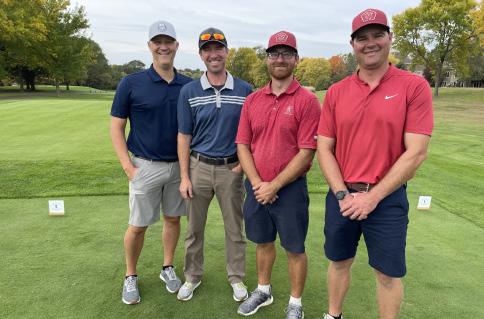
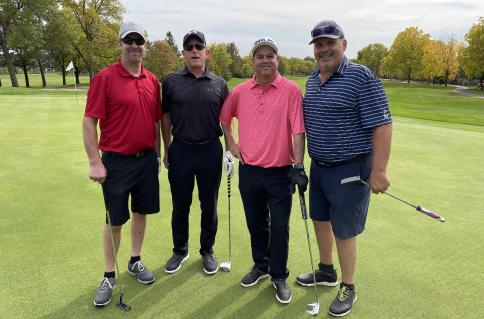

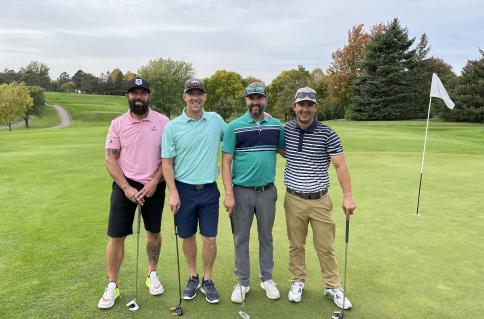
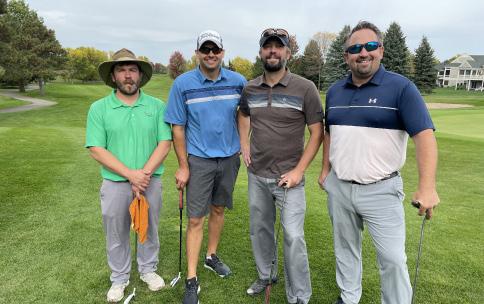


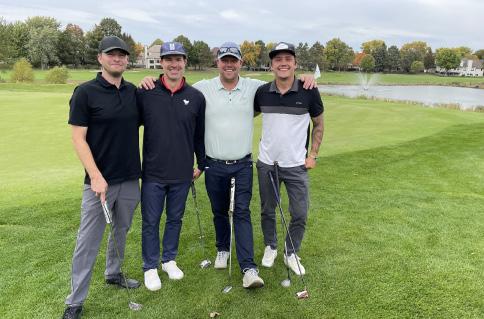
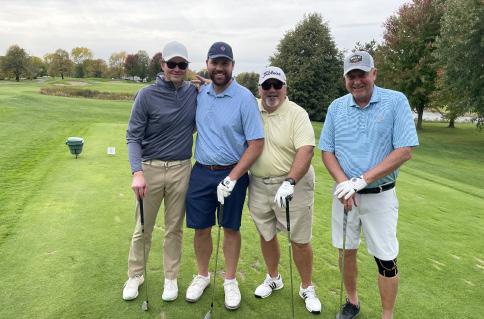
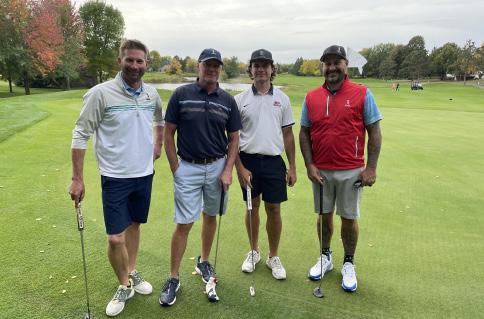
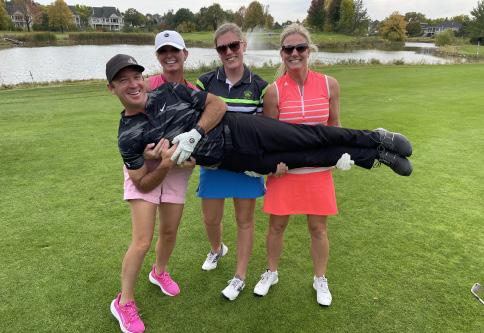


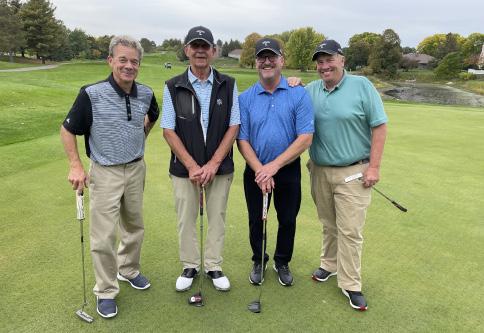
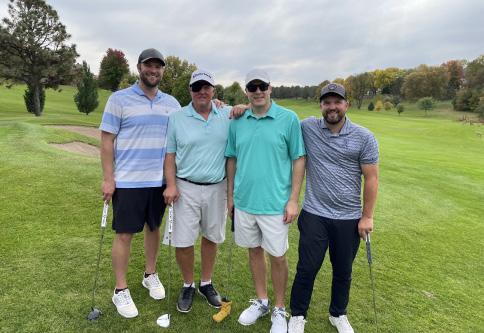

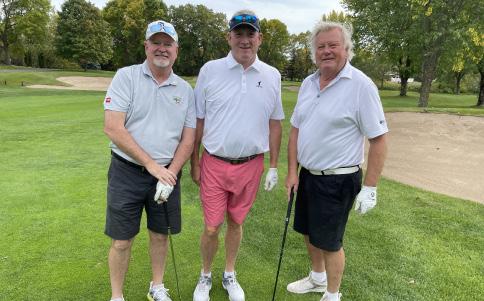
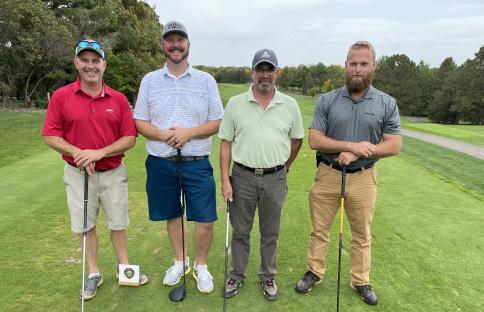

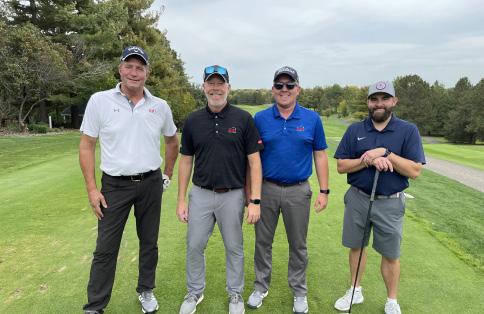
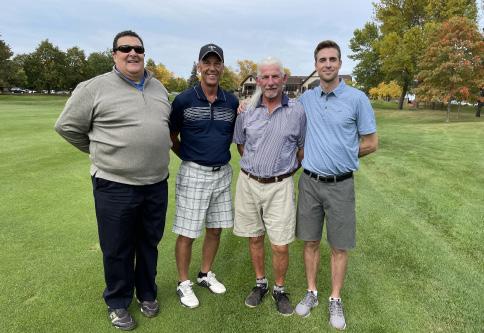
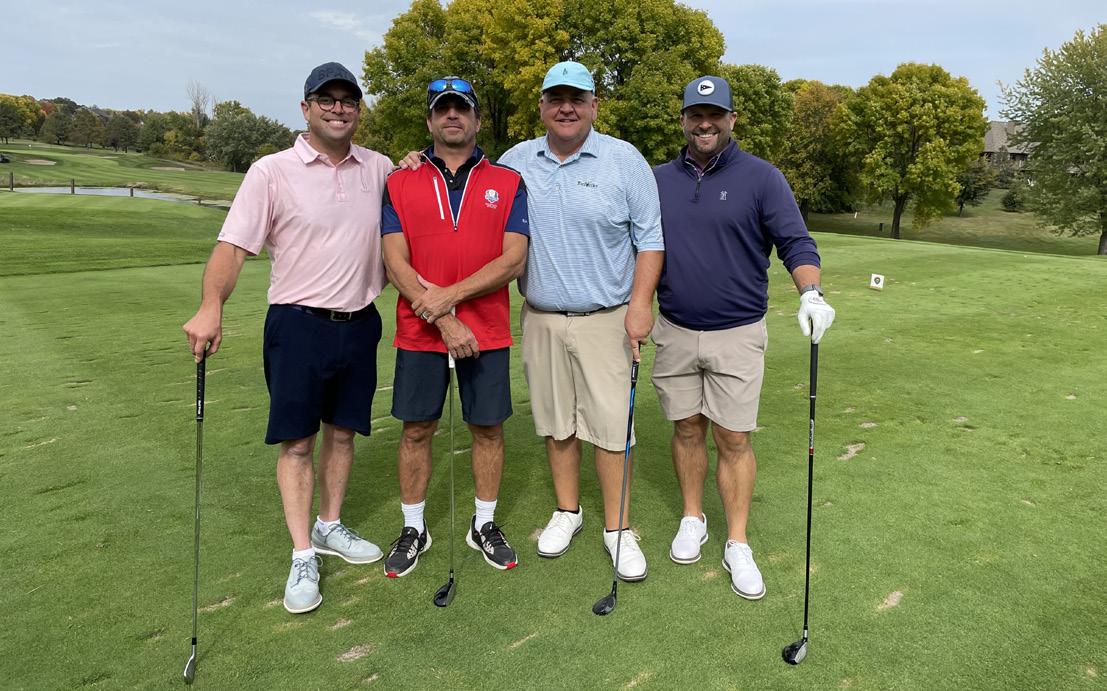

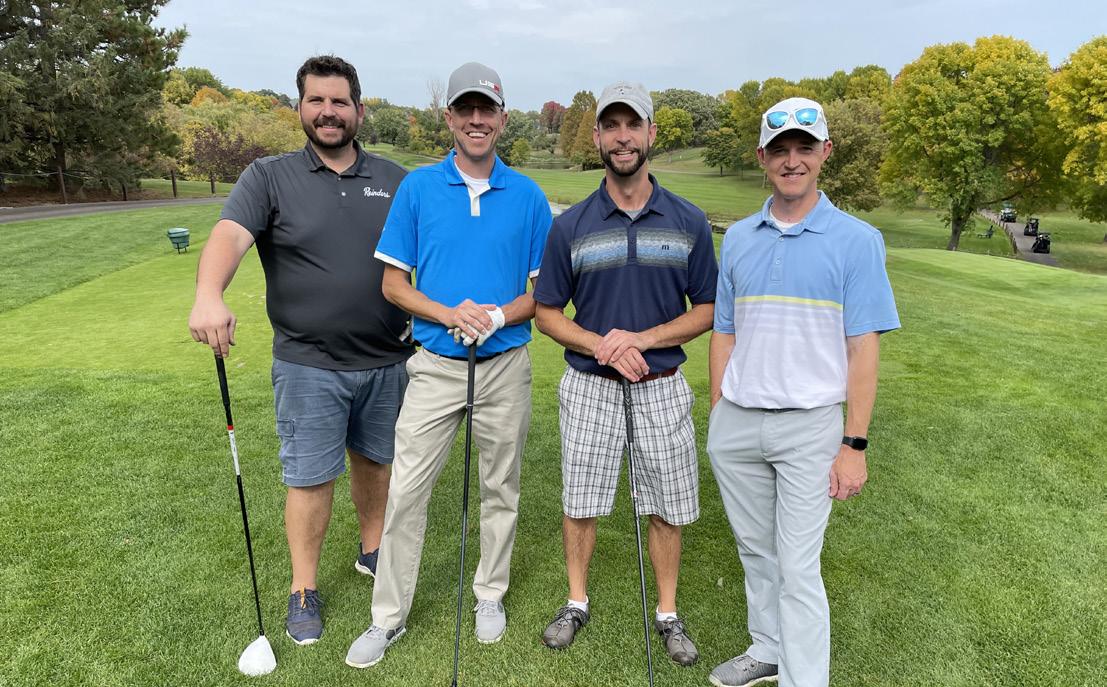

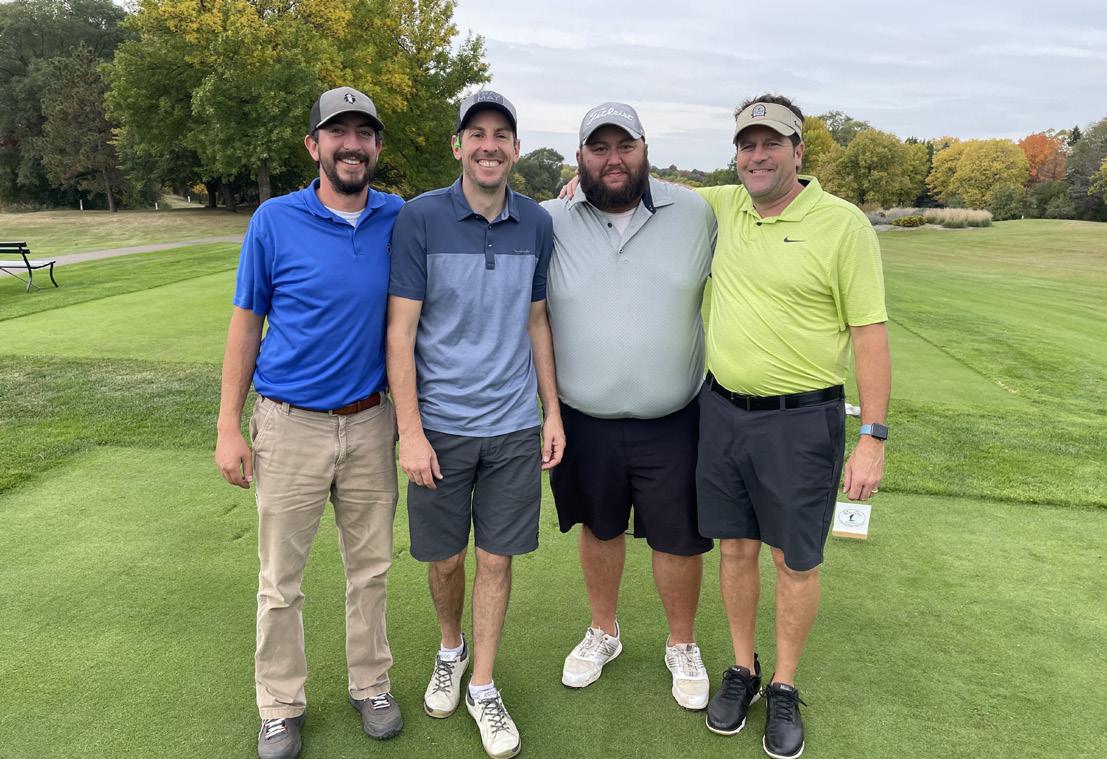
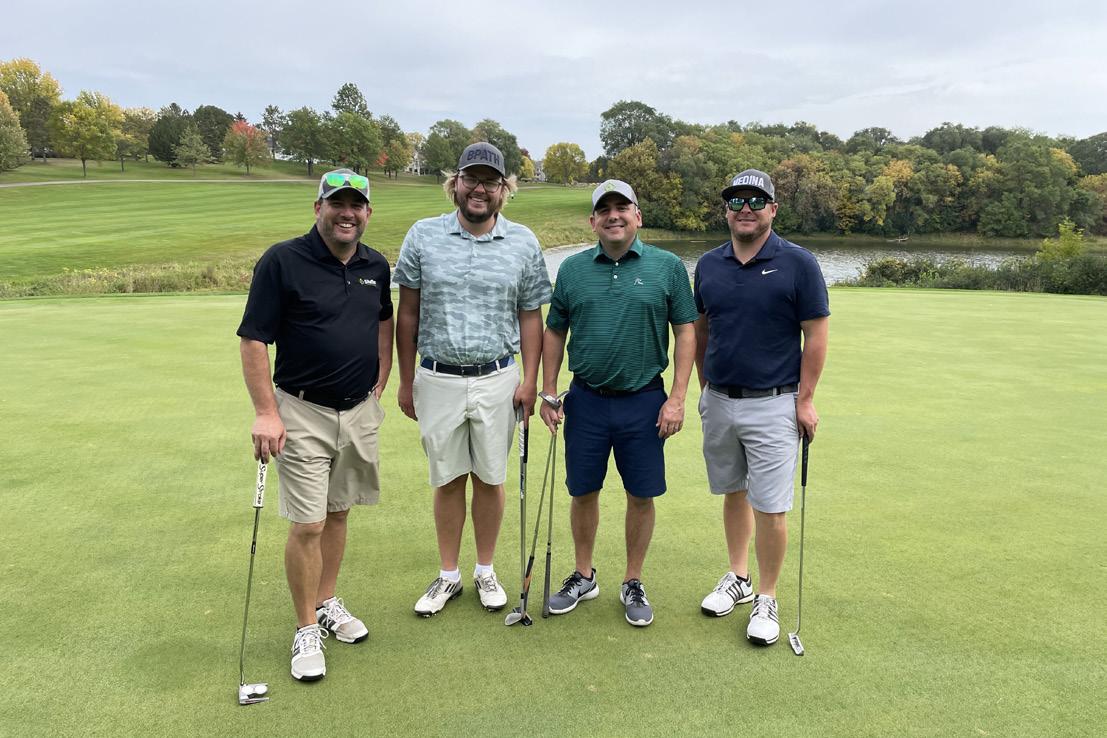
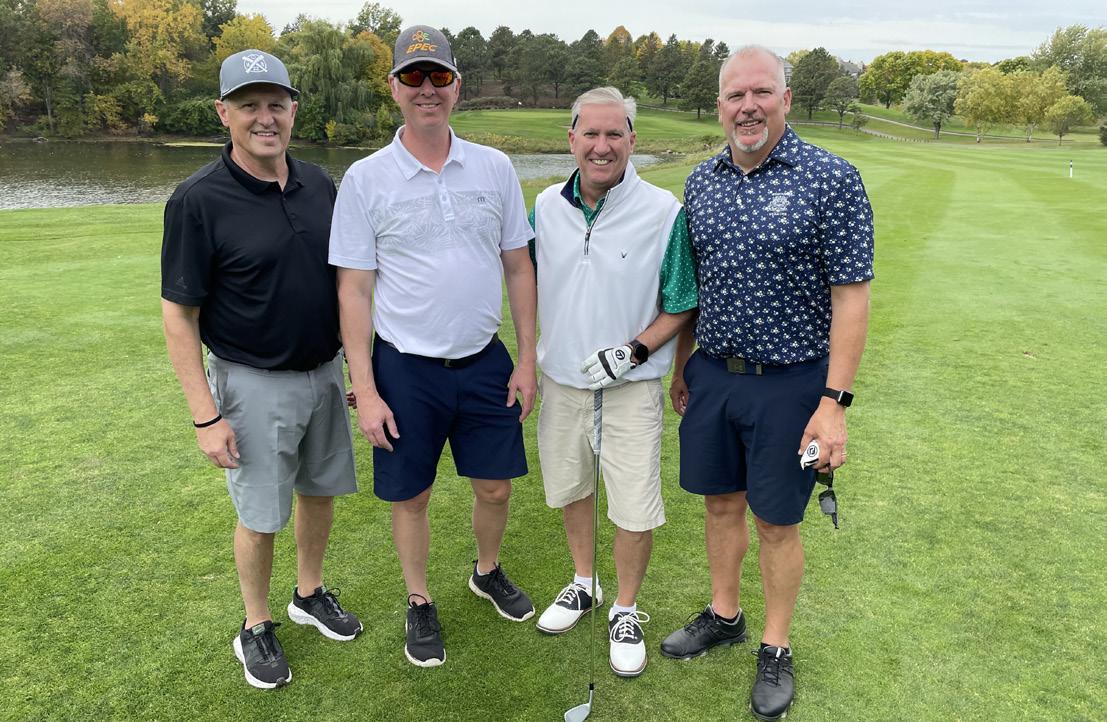
Contributions in 2022: $23,400 Your support is greatly appreciated!
Duininck Golf Big Check Donation $2,300
MTI Distributing Title Sponsorship $1,650
Par Aide Title Sponsorship $1,650
Reinders Title Sponsorship $1,650
Winfield Title Sponsorship $1,650
EC Grow Title Sponsorship $1,650
Prime Source Title Sponsorship $1,650
Syngenta Dinner Sponsorship $900
Bayer Dinner Sponsorship $900
PBI Gordon Dinner Sponsorship $900
SiteOne Golf Lunch Sponsorship $500
Hartman Lunch Sponsorship $500
DLF Lunch Sponsorship $500
Mitchell Products Lunch Sponsorship $500
Vineland Tree Care Lunch Sponsorship $500
Bellwood Oaks Golf Course Cash Donation $500
Plaisted Companies Bullseye Challenge $350
Tessman Bullseye Challenge $350
Club Car Bullseye Challenge $350
Turfco Iron Challenge $350
Jack & Kim Mackenzie Iron Challenge $350
Frost Inc. Wee Putt Sponsor $350
Gertens Wee Putt Sponsor $350
Superior Tech Products Wee Putt Sponsor $350
Twin City Seed Co. Wee Putt Sponsor $350
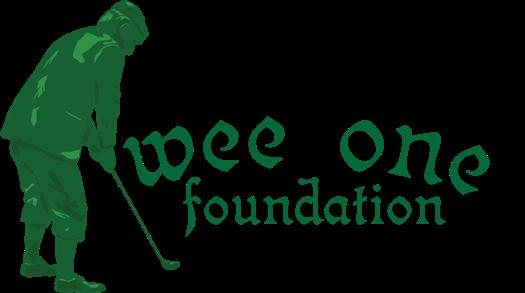
Quest Products Wee Putt Sponsor $350
Excel Turf Tee Sponsor $250
Brackett’s Crossing CC Tee Sponsor $250
BASF Tee Sponsor $250
Leitner Company Tee Sponsor $250
Nufarm Tee Sponsor $250
Nature Safe Tee Sponsor $250
Corteva Tee Sponsor $250
FMC Tee Sponsor $250

Little Island, Co. Cork, Ireland, once upon a time my Home. Golf, it seems is part of everyday life there. No matter your economic situation you play, work, and talk golf. Listening to golf stories revolves around the inevitable missed putt, caddie loops, and looking for golf balls in the Gorse bushes.
The local club is an Alister MacKenenzie deign from 1888, Cork Golf Club, it’s a gem of a parkland layout. Known locally as “The Island”. Jimmy Bruen’s home course and Ireland’s first golfing superstar. The impact of golf could be seen everywhere in our community. It provided many families with a


source of much needed income. Growing up in the seventies and eighties Ireland was struggling with high unemployment and a lack of opportunities. The golf club, a holdover from the era of occupied Ireland was a bright spot, it helped put bread on the table for many families as work was found caddying
and looking for lost golf balls. I remember classmates being excused from primary school so that they could caddie an event at Cork golf club. This was our normal, school could wait.
I like to be outside, a common thread for those in the golf maintenance industry. My first



job was working on my uncle’s farm, Clash Farm. I learned a lot there, working with the livestock and running the machinery. The writing was on the wall for Irish agriculture as Brussels reduced production quotas and diminishing autonomy took the fun right out of farming. It was time to adapt and that was get out of agriculture and get into golf where the market was far from satisfying demand. The development of Clash farm into an 18 hole golf course with clubhouse and
restaurant. Being that involved in the creation of Harbour Point GC was one of the most special accomplishments of my life. I knew this was the field I wanted to have a career in. Historically Greenkeeping was along the lines of a trade, with an emphasis in “on the job training”. I had set my sights on being a manager so this wasn’t automatically a natural fit. I also knew I didn’t want to work in the family golf business. I had traveled enough to know that I wanted to see more of the world. A new course was being offered in Golf course management, at

Myself, Paul, and Course manager, Pat Murphy 1989 Harbour Point GC

Reaseheath College, Cheshire, England. I enrolled in this HND, three year program. So off I went at the tender age of 19, abroad, to pursue an education. Those first weeks were tough, being away from home and country. I think this distance steeled me and helped me commit to my chosen field, and with this I had success, staying on top of the college workload and experiencing so many new things. A school bus tour to Scotland and walking the Old course at
St Andrews is a great memory.
I did my 12 month internship at Killarney golf and fishing club, in Kerry Ireland. I returned to college for my last semester before graduating with a degree in turf management. Class dismissed, and I’m back to Ireland before packing my bags again, this time I’m going way, way west to Minnesota to work at Wayzata CC. Working with Bob Distel, Superintendent, I extended my stay and became
the Assistant. I enjoyed my time at Wayzata and remain grateful for the experience that lead me to my eventual goal of becoming a golf course superintendent. I achieved this goal in January 2001 and have been at Alexandria golf club since. It’s a great place to live and I enjoy the people here so much, it has a great tradition and a feeling of
belonging that I would describe as family. Means a lot to a lad a long way from his irish home. Thank you Jeff Ische for nominating me to Roll it Forward. I in turn nominate Julie Driscoll, Manager of all things at Wayzata CC. I look forward to hearing what Julie, the person who does it all, has to say.


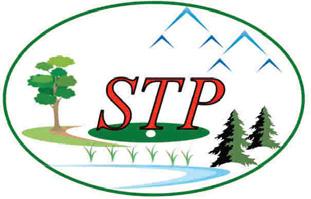







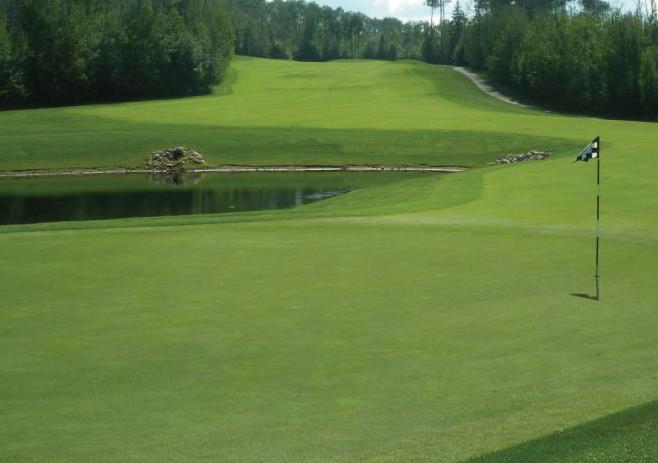
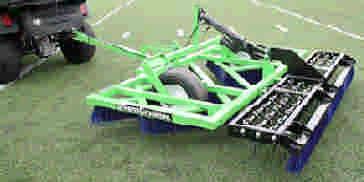
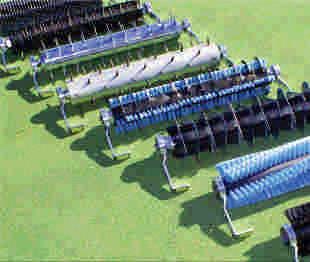
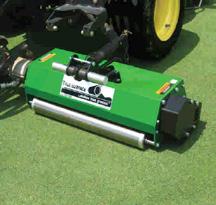
Thank you Host Mike Sonnek and the staff at Royal Golf Cub. It was a beautiful day as we wont forget the 80 degrees in October!
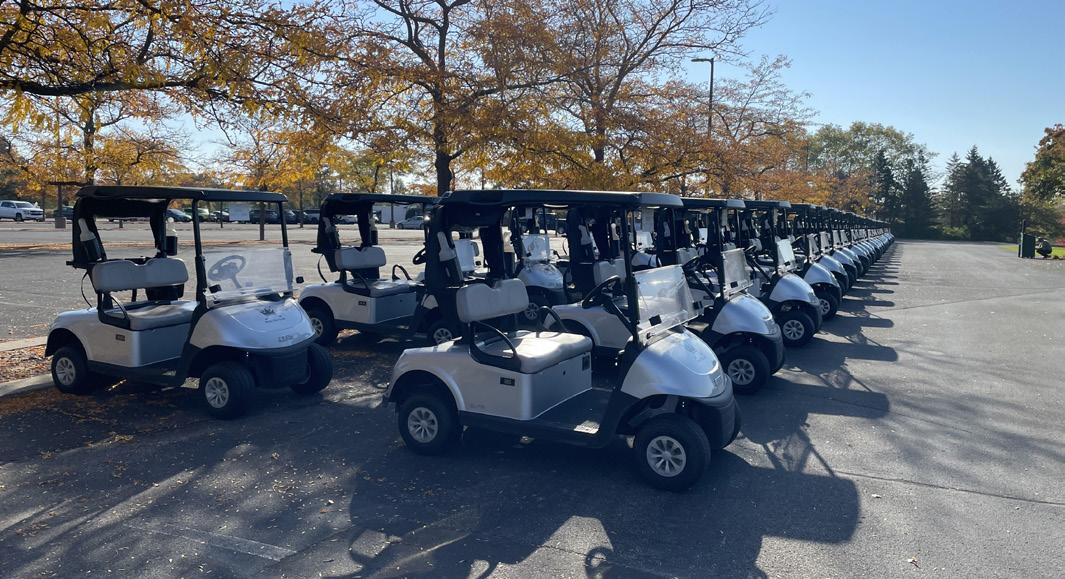
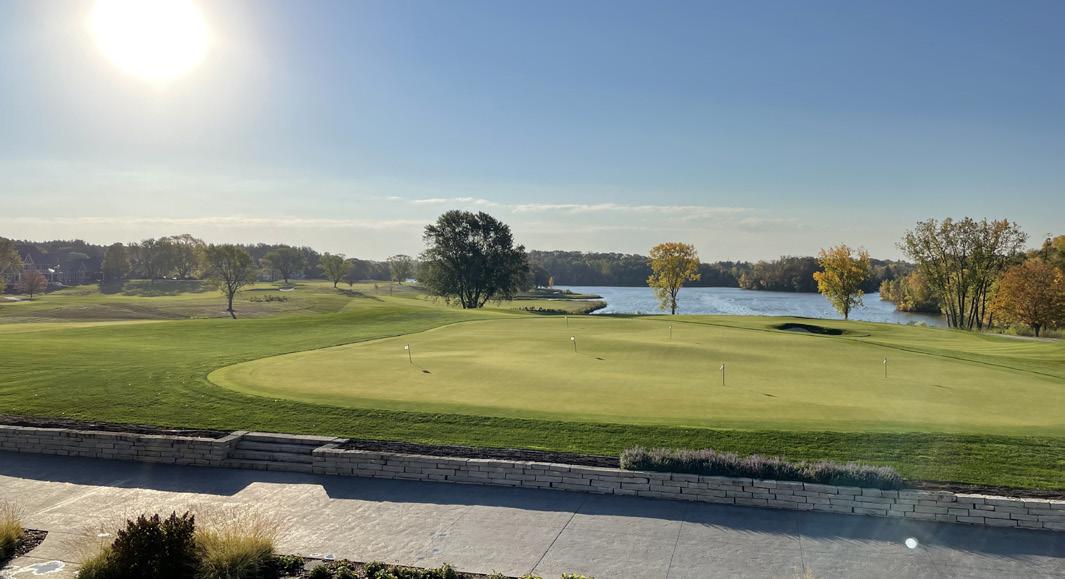
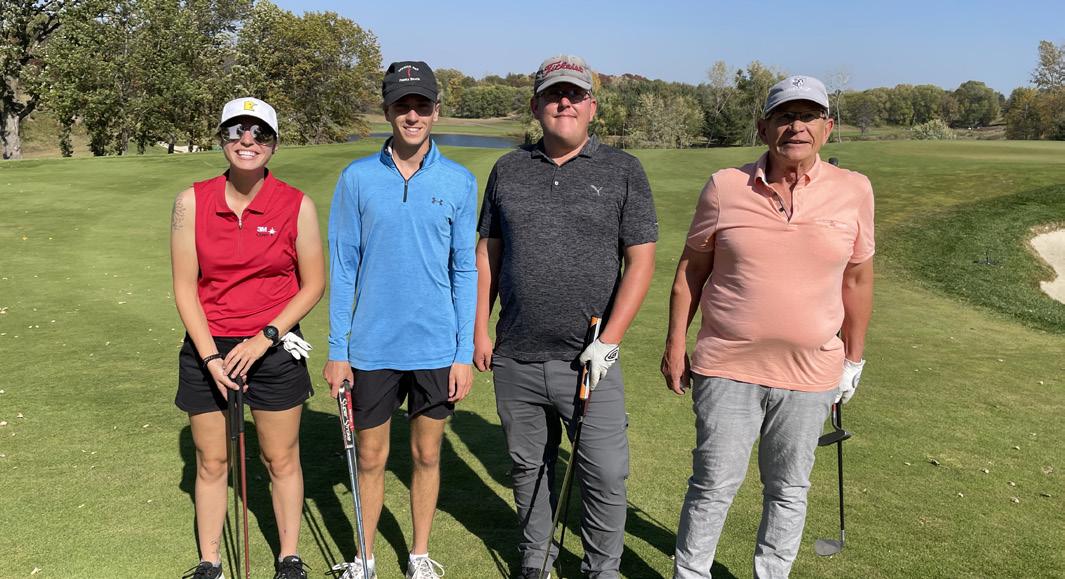






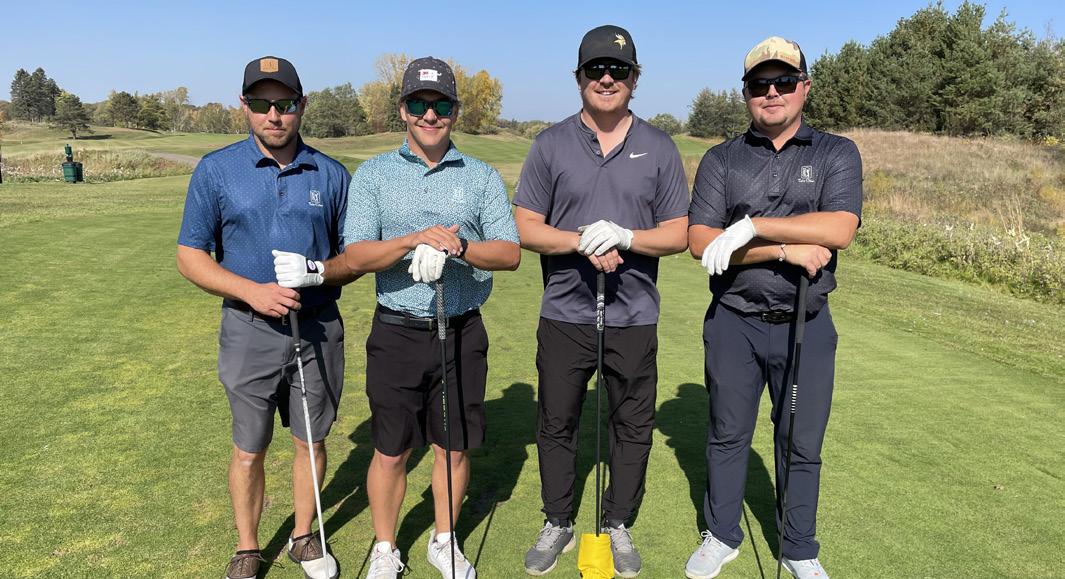

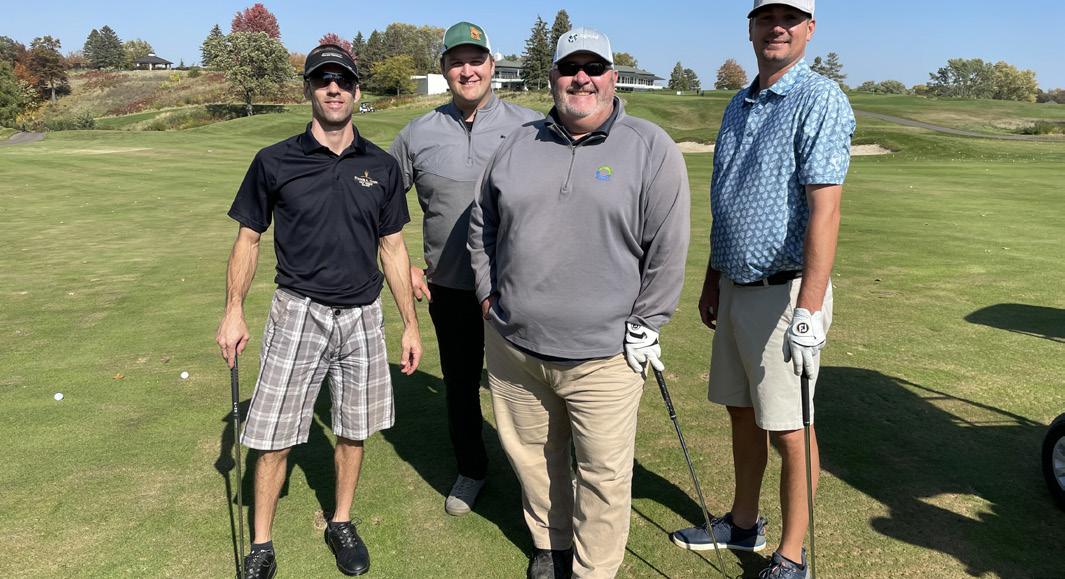
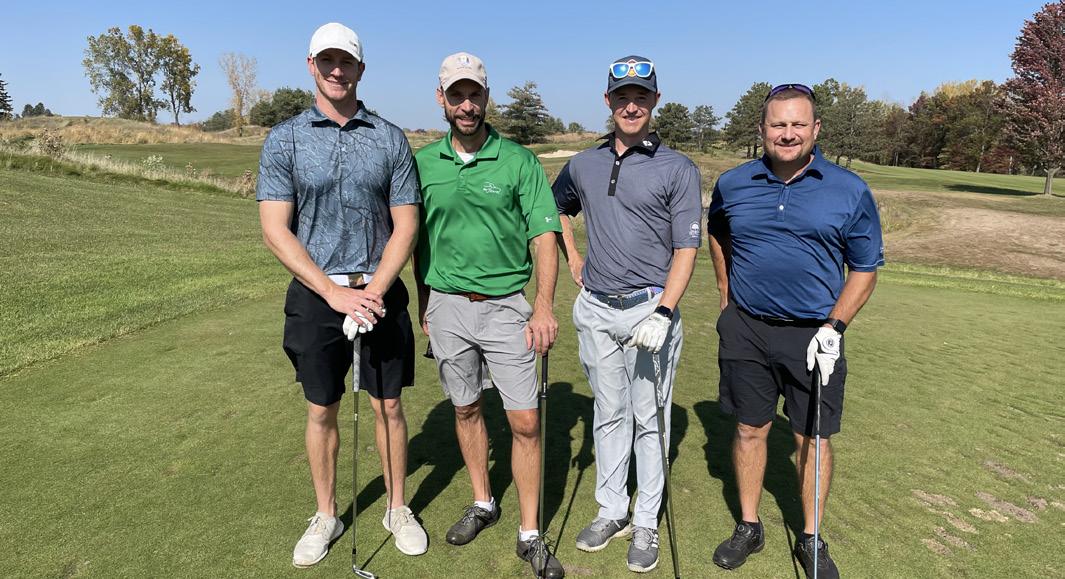

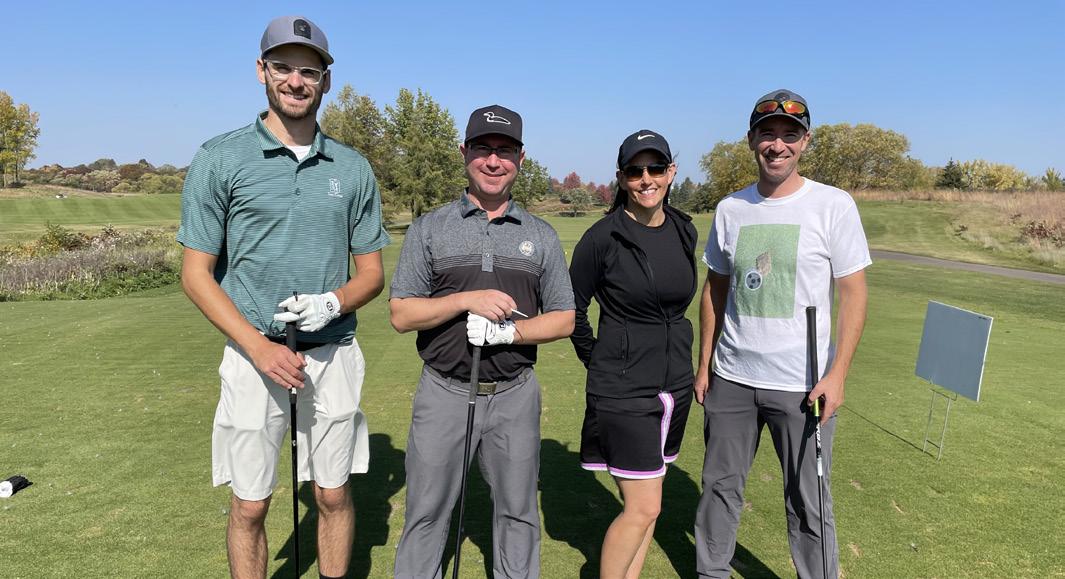

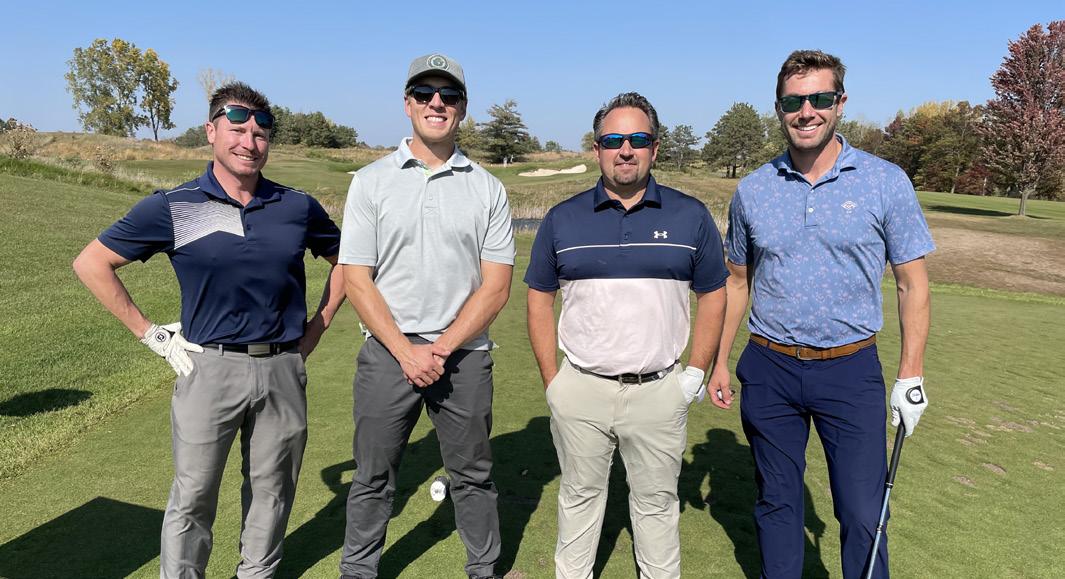
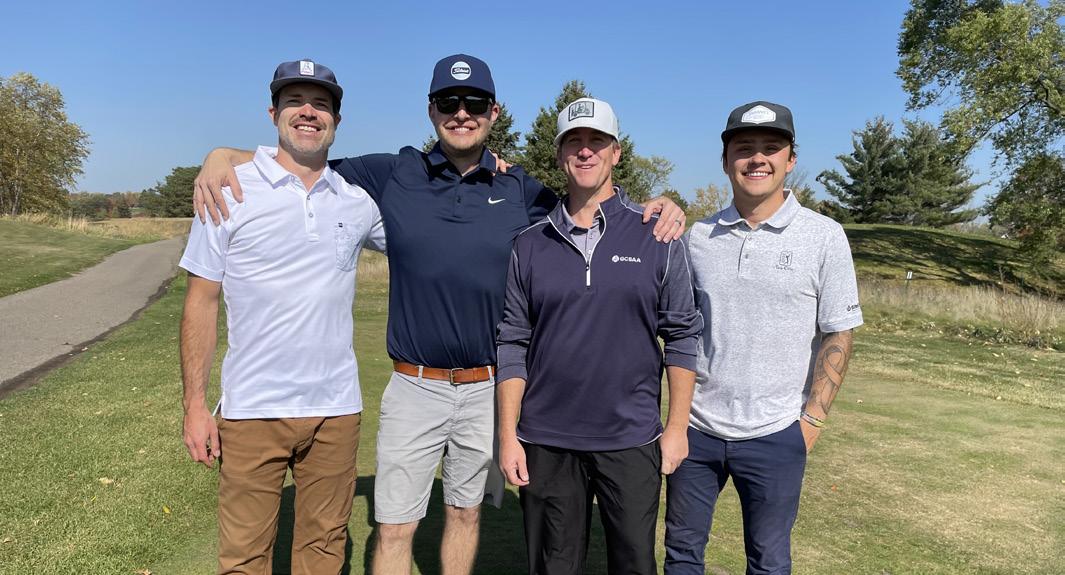

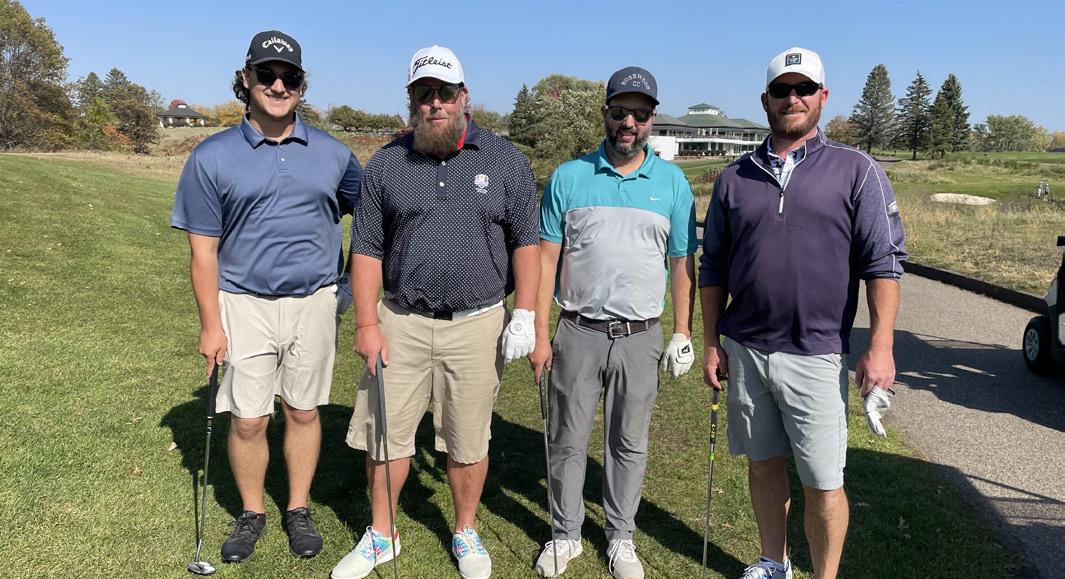
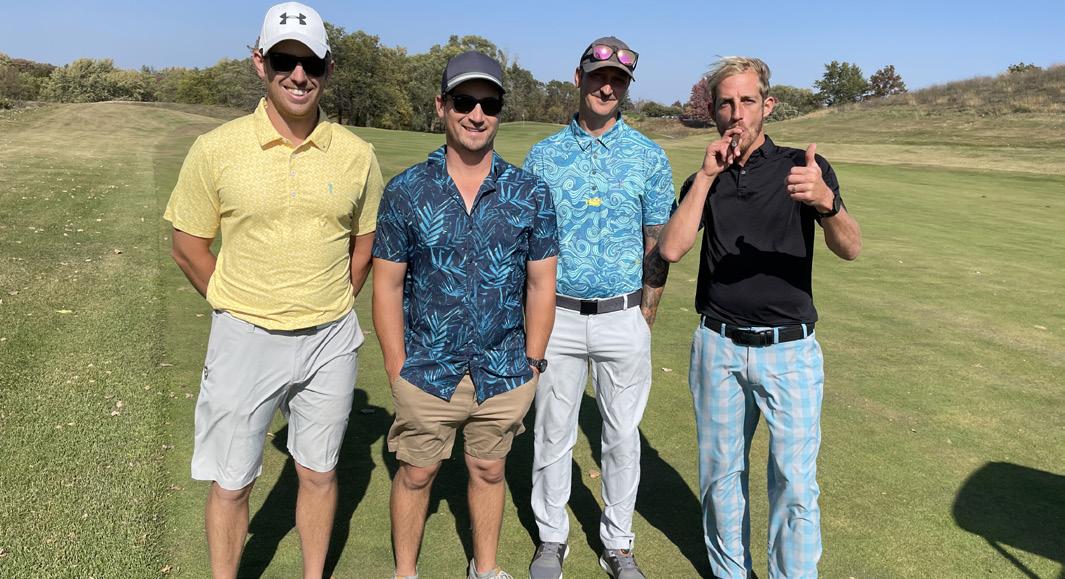

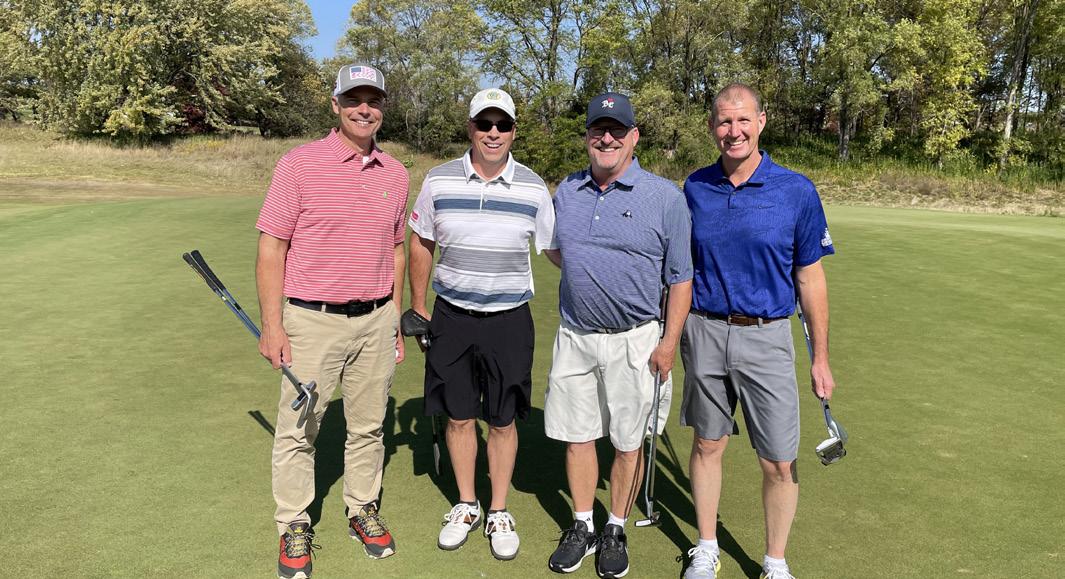




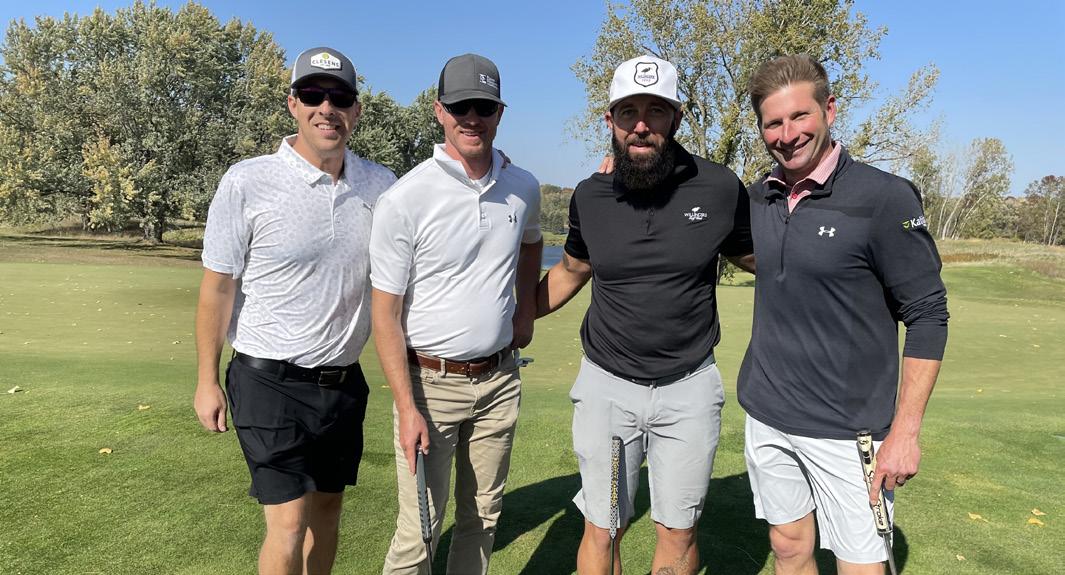
Congratulations to Scott Trahan with Legacy Golf, for his Hole in One on #16, and the rest of his team for winning the skins game and a 1st place finish!
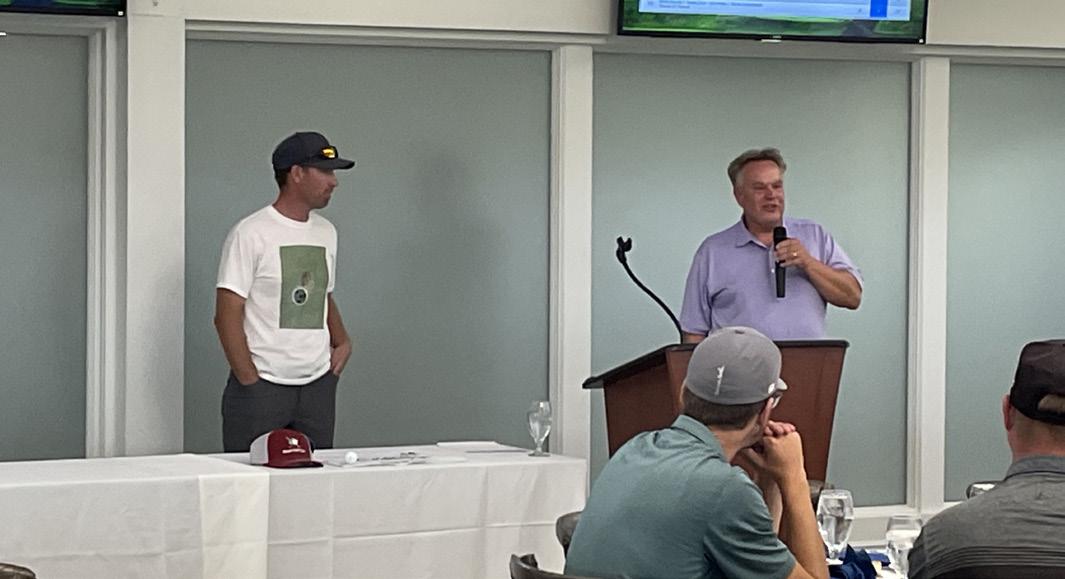

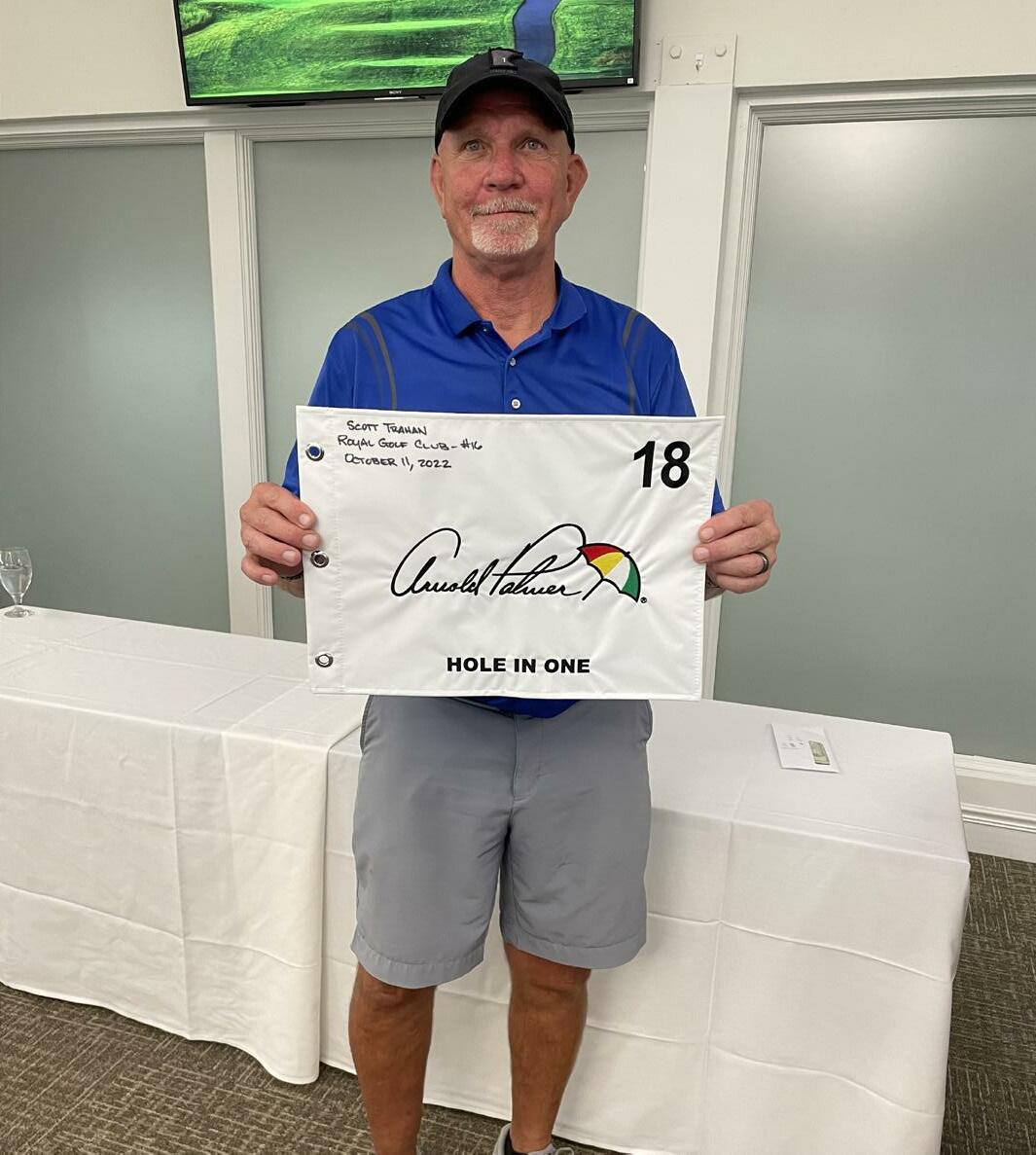
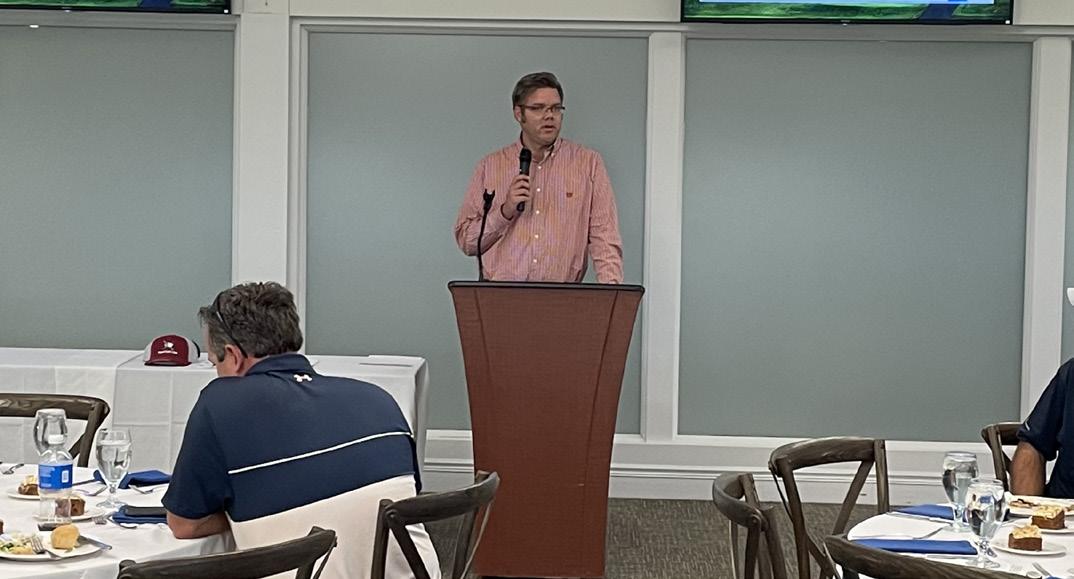





How many years have you been in your current position? 2 years
How many years have you been in the turf industry? 7 years Where else have you worked?
Crew Member- Maple Bluff Country Club- Madison, WI
Student Intern- National Golf Links of America- Southampton, NY Assistant Superintendent- Medinah Country Club- Medinah, IL
Turf School Attended (if any)? The Rutgers Professional Golf Turf Management School

you would like to participate in
future
reach out to Chris at chris@mgcsa.org
What is one “master plan” thing you would like to change at your golf course?
Re-grassing the greens and fairways. They are currently old bentgrass mixed with poa. It would improve playability and turf management if we had newer bentgrass cultivars.
What concerns do you have the turf business and the future of golf? Other the labor shortage, I think Robotic mower maintenance is something we need to all think about. Now that we are seeing robotic mower prototypes in the industry, we will have to come up with gps hardware maintenance plans and see what that looks like in terms of a repair timeline and cost.
What is needed to bring more young professionals into the industry?
I think we need to continue growing the game of golf. Many superintendents and assistants enjoy golf to some degree. If we can get more players introduced to the game of golf at a young age it will help tremendously. Organizations like the First Green do a wonderful job of teaching the youth about golf and what greenskeepers do.
What piece of equipment do you want? Not a need, a want. A Ventrac. We have a lot of steep banks and thick wooded areas- I think this machine would succeed in both areas. Plus, it has so many attachments that are of great use as well.
In terms of industry costs (equipment, pesticides, labor, etc.) are they too low, too high or just right?
I think industry costs are fine right now. It’s not just the golf industry that is seeing price hikes and longer waiting times, it’s across the board.
Have you ever met a celebrity? Who?
The Steelers head coach, Mike Tomlin. I met him at Townline BBQ in Sagaponack, NY. He was driving an all black military vehicle.
What is your favorite vacation spot? Monterey, California. The views, golf, and food are unbeatable.
What is your favorite memory of starting your turf career? Working the 2018 US Open while I was at National Golf Links, which was right next door to Shinnecock.
What is your favorite job on the golf course?
Cutting Cups- It’s my favorite because you’re the one deciding the difficulty level of the course that day.
Have you played any famous golf courses? Which ones? Yes, I have been fortunate enough to play San Francisco Golf Club, Pasatiempo Golf Club, Shinnecock Golf Club, National Golf Links of America and Maidstone Golf Club.
Who is your dream foursome? My dad, my grandpa and tiger woods.
2020- What a year! Would you like to comment on how it affected you, and how it has changed your management approach now?
2020 was quite the year. I was working at Medinah Country Club at the time with a crew of 65+ people. We didn’t let anyone eat inside and I had to write down the crew members hours and manually enter them. Not only that, but we had to limit our spending. 2020 taught me to not take and time clock for granted and how to stretch a dollar and figure out where to cut costs.
For this month’s UMN update, I wanted to provide an update about some exciting personnel changes in the turfgrass science program.
We have been without an Extension Educator for Turfgrass since May. I am happy to let you know that Dr. Jon Trappe has accepted an offer from UMN Extension and will begin as the new Extension Educator on October 24, 2022. Many of you will remember Jon from his time as a postdoctoral associate in our program, where he led several applied research projects and was active in outreach and Extension activities. We are really excited to have Jon coming back to UMN. You’ll hear much more from him soon! We are grateful that UMN Extension was able
to fill this position so quickly.
Gary Deters joined our group as the manager of our field facility in March 2020. His addition to our team has been tremendously beneficial. Gary quickly became fully integrated into the research program and ensured that our field research facilities were top notch, allowing for better research to be delivered to the public. Gary has decided to shift his role in our program and will be taking over our lawn water conservation position-in this role, Gary will lead outreach efforts for Twin Cities residents and public entities with the goal of reducing water use on turf areas. He will also work with professional groups such as the MGCSA on issues related to water use and policy.
We will be hiring a new field facility manager--if you know someone who might be a good fit for that position, we have more information at https:// turf.umn.edu/were-hiring-turfresearch-field-facility-manager.

Dr, Michael Barnes, recently a postdoctoral associate in our program, is staying on our team as a full-time researcher. Mike has become a national leader in the research related to the ways people interact with turfgrass systems, and his current work on turfgrass science curricula, as described in the August issue of Hole Notes, will be important as we seek opportunities to bring more people into the Minnesota green industry.
As of September 12, I began a new role at UMN as Vice Provost for Distributed Learning, a new position that will help guide strategy for online learning throughout the University of Minnesota system. As part of this transition, I will no longer be teaching; however, I will continue to lead the turfgrass science research program. In my new position, I hope to guide changes at the university that lead to greater opportunities for Minnesotans to access the great educational opportunities available on our campuses through online learning. This includes seeking solutions for educating and preparing students, both traditional and nontraditional, for careers in the
green industry. As for replacing my teaching role, including turfgrass management courses, we have been able to figure out good solutions for this semester--Sam Bauer is currently teaching the introductory turfgrass management course. The Department of Horticultural Science is working with the college to identify a more permanent solution.
We have been fortunate to have several very talented individuals come through our program, many of whom continue to impact the turfgrass industry in new roles. Continued support from the MGCSA and other turfgrass groups in the state helps us keep pushing forward with new research-based solutions for turfgrass managers in Minnesota and beyond.
We are still trying to find Minnesota golf course superintendents willing to help take weekly observations on their course this winter. This is important work that will greatly help us identify solutions to winter injury of turfgrasses. To learn more and sign up, go to http://z.umn.edu/WT-Y2.
Share your strange, funny, and unique photos from your time on a golf course? Send your images to chris@mgcsa.org.
Even the teachers had to try out the Sidewinder!
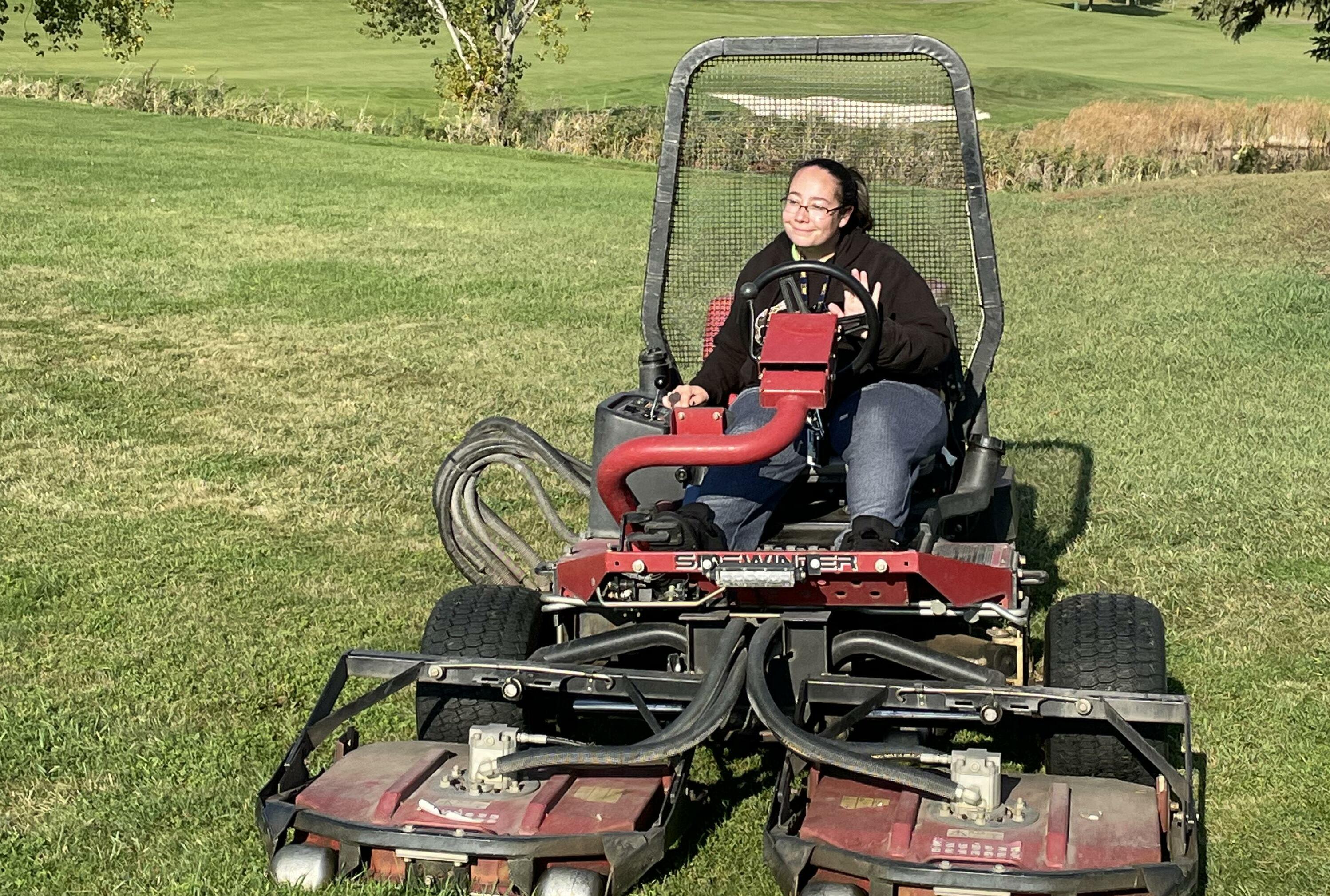

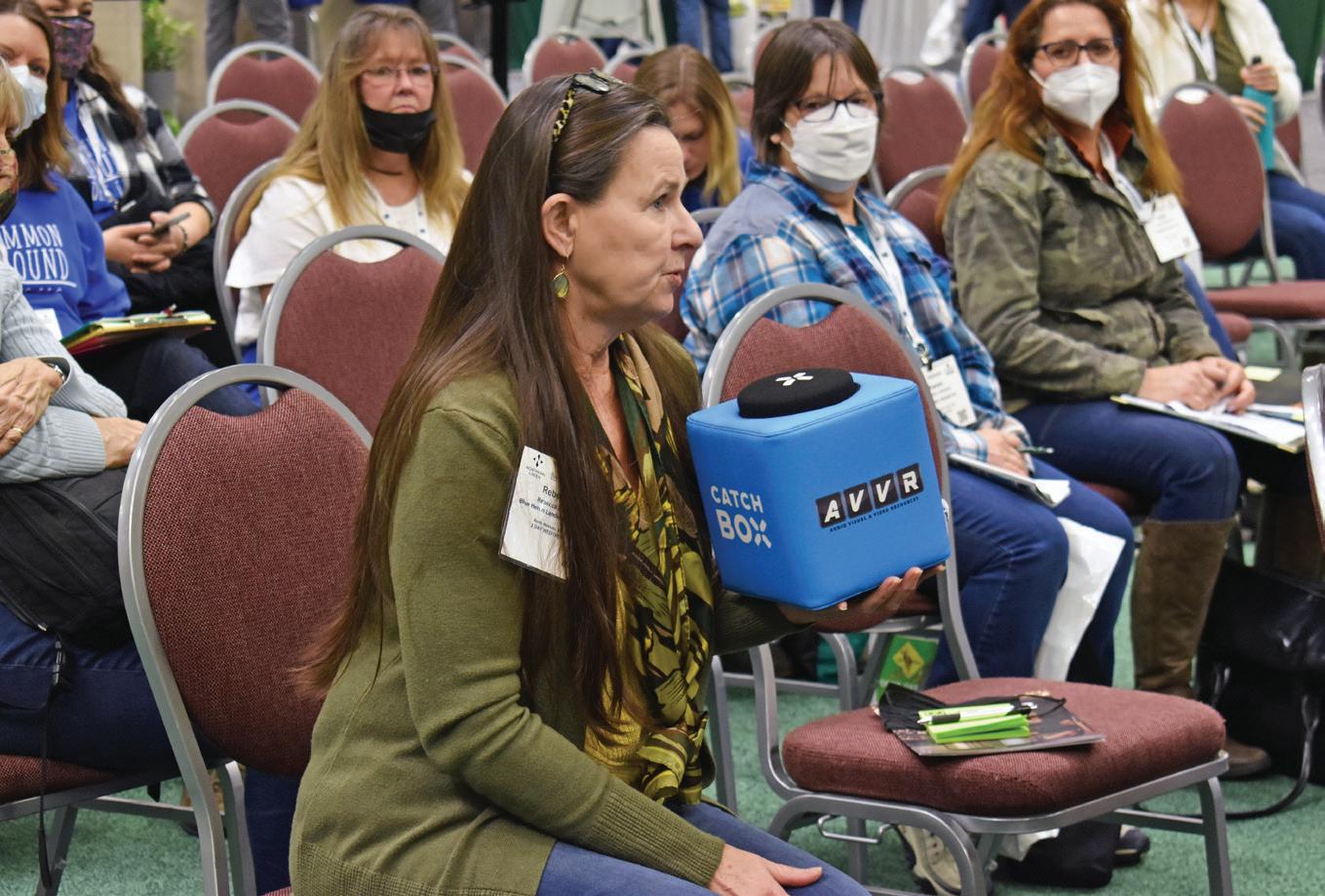
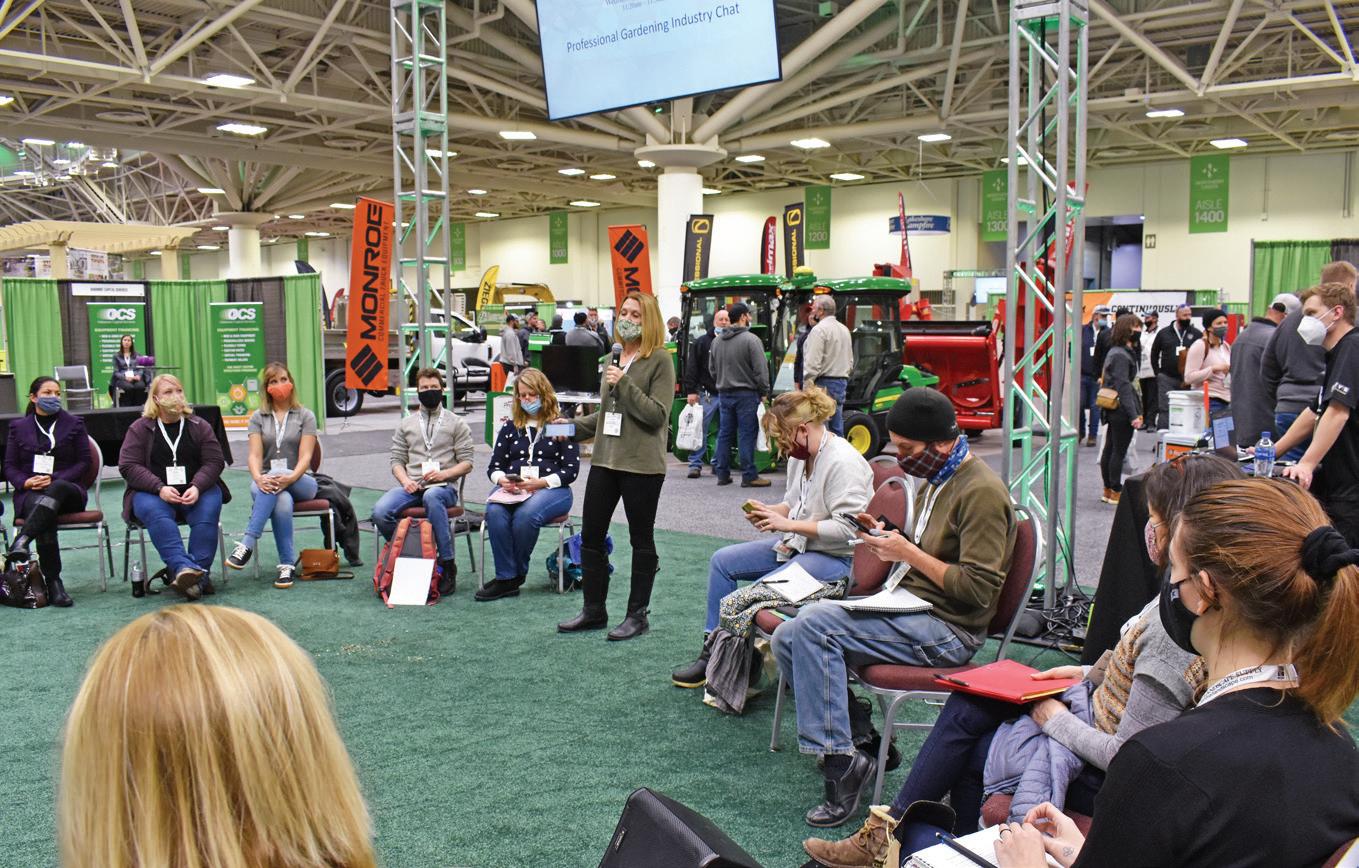
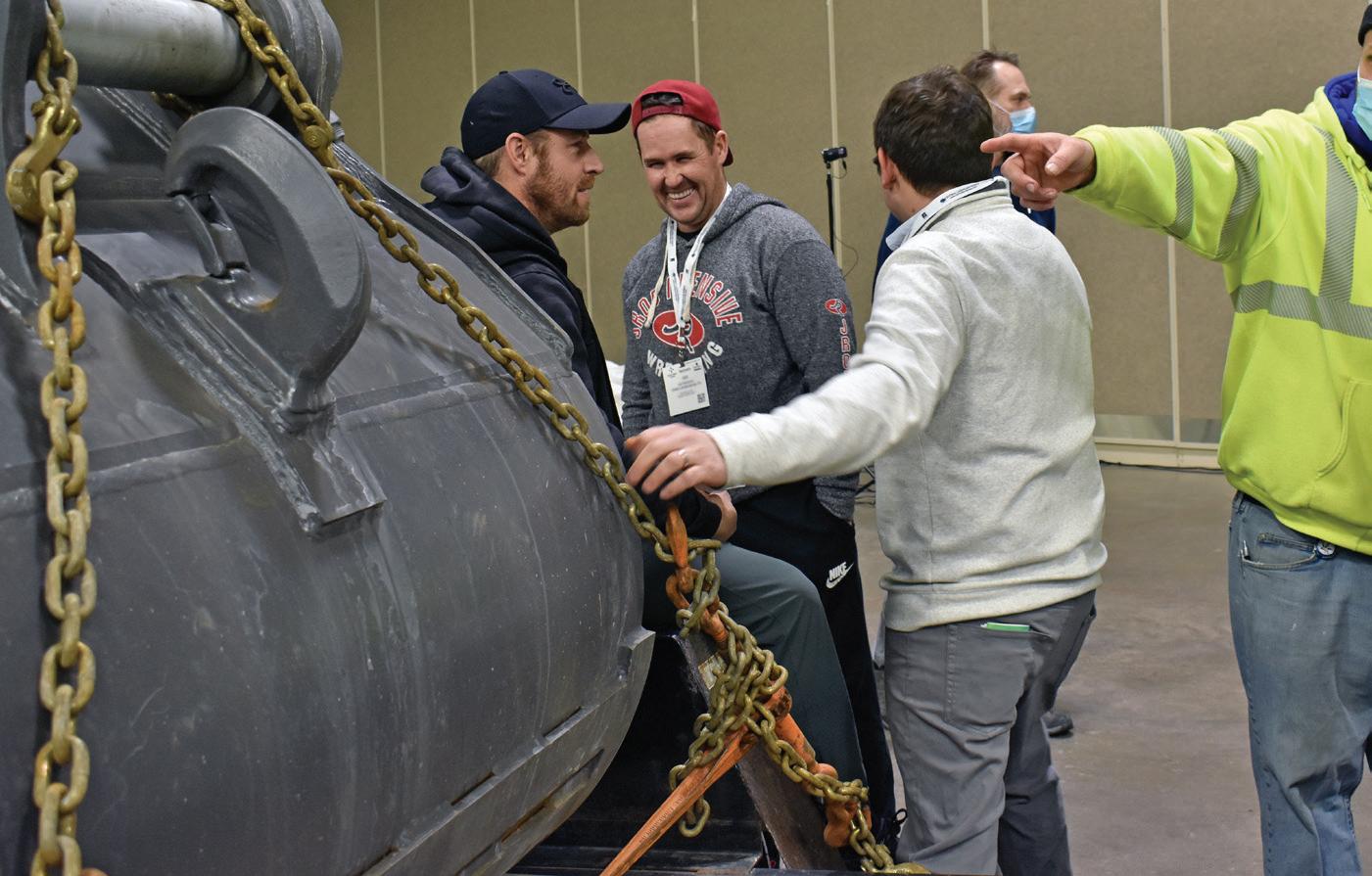
December 7-8
8:00-3:00 each day

The MGCSA is excited to announce the 2022 MEGA Seminar! Guest speakers this year include; Shawn Emerson discussing his career and life as a superintendent. Gina Rizzi will inform us on the natural capital of golf courses and the power of purpose in leadership.

Dr. Beth Guertal join us to talk about physical soil properties and nitrogen fertilizers, and Frank Laverdara will dicuss the features and benefits of Audubon Ceritifcation.
Also featuring Town & Country Equipment Manager Chad Braun, GCSAA, and the UMN Turfgrass Science Department.
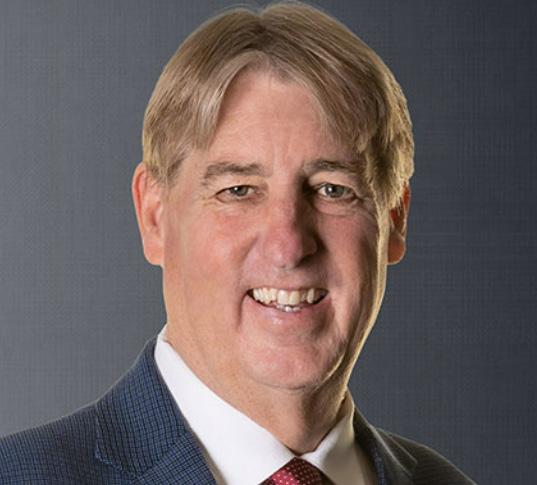


Dr. Beth Guertal
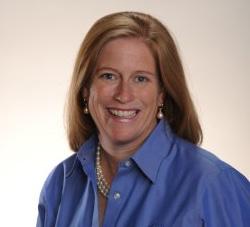
This month we’re going to jump through a few different areas. First, the Member Needs Survey is still open. We will continue to solicit participation going forward, fully understanding that now is a busy time for all facilities. The survey is available for you on any of the upcoming frosty mornings, please consider taking it when you have that moment. We will be aggressive in pursuing participants after the season winds down. There are still several gift card drawings available for survey participants! To those of you who have responded already, thank you for the beneficial information.
One topic that I would like to discuss further is the Northern Green Expo (NGE). First off to be clear, this is not an MGCSA event. The MGCSA does not pay to participate, nor does it directly benefit our financial situation. This event is organized by the MNLA with proceeds
directed to the MTGF. The MTGF then directs funds to various turf and grounds projects, with turfgrass research being consistently their top benefactor. That is where your participation supports the golf industry, a large portion of the funds generated by the NGE typically goes to turfgrass research. The MGCSA’s role is to help define the educational content for the event, within the NGE schedule.
Many of you in the survey have discussed the feeling that the event is stale, or education is lacking, or there aren’t enough golf focused opportunities. Those are common statements that we have been hearing over the last few years. The MNLA has heard those comments as well, not just from us, but other allied associations involved

with the NGE. They are now planning to make changes.
For this year, 2023, the event will be the same as it has been due to existing contracts. However, 2024 will see a brand-new event, with a new location, and new formats and opportunities that will work to solve some of our participant concerns. This is an exciting opportunity to help them redefine the event as they have allowed our representatives to provide a golf perspective while they reimagine the entirety of the event. We are partners in this event only as much as our members show up and participate, yet we reap the benefits with substantial financial support for turfgrass research.
Switching gears into a timelier topic. We are only a few weeks away from midterm elections. Now is an important time to not only consider your personal perspectives, but also how these candidates will affect the golf industry. Please prepare yourself by seeing who is on your ballot, follow the link here to the Voter Information Portal.
Voter Information Portal (state. mn.us). As we continue to fight for water assurance, among other issues, it is important that we work to establish relationships with our legislators, and now is an opportune time.
Our Day on the Hill event will return this year (Currently scheduled for February 1st), and we need to come back with a strong presence. Plan to join us on that day but in the meantime, prepare yourself for the upcoming elections, educate yourself on your candidates, and possibly even try to begin a dialogue with them.
The GCSAA implements a grassroots approach to advocacy, one that we should mimic in our state. We still need a few ambassadors for the Grassroots Ambassadors Program, please reach out if interested in representing your district. Those relationships with legislators and the real conversations with a constituent, are the efforts that will help move our legislative priorities forward.
A large part of our advocacy efforts is sharing the good stories of our stewardship. Let me know when you have a successful project, or stewardship improvement initiatives that I can share with the membership and with legislators. We can use all of our stories to strengthen our case. Recently, Brandon Schindele, Superintendent at Edina Country Club, was featured on a WCCO broadcast about water use. This feature was supportive of golfs efforts and shone us in a reasonable light. Brandon says there was much more that was not aired, which is too bad, any chance we can share a positive story is valuable to our efforts.
One thing that gets lost in our conversations, and even in the survey responses, is environmental stewardship. It is not clear what importance it holds for many of you. The reality is environmental stewardship, IS advocacy for us. These efforts to save water, use less chemicals, to just be more responsible land managers, those are the stories and battles we take to the capital. We must ensure that those standards are being met as an industry. Our goals in advocacy are directly related to our successes with stewardship. Make sure we are standing with all of our members and being the responsible, professional stewards, we all know we should be.